“Mudd’s Women”
Written by Gene Roddenberry and Stephen Kandel
Directed by Harvey Hart
Season 1, Episode 3
Production episode 6149-04
Original air date: October 13, 1966
Stardate: 1329.8
Captain’s log: The Enterprise is pursuing an unidentified Class-J cargo ship. The cargo ship is pushing its engines to the limit in its running-away strategy, and refusing to communicate. When the ship’s engines finally overheat, it’s adrift in an asteroid field. Kirk orders Lieutenant John Farrell to extend the deflectors around the cargo ship, but that starts to mess with the Enterprise’s engines. Scotty and Spock try to beam the crew aboard by locking onto their distress signal—but by the time they complete the transport, the Enterprise has burned out all its lithium crystals but one, and the last one has a hairline fracture.
Scotty beams aboard the shipmaster, a piratical looking chap—seriously, he’s got the floppy hat, the handlebar mustache, the poofy shirt, big belt, earring—who speaks with a comedy Irish accent and identifies himself as Leo Walsh. The only other crew on board are three hot babes—two blondes and a brunette—whose very presence turns Scotty and McCoy into drooling idiots, and also turns the camera settings to soft-focus.
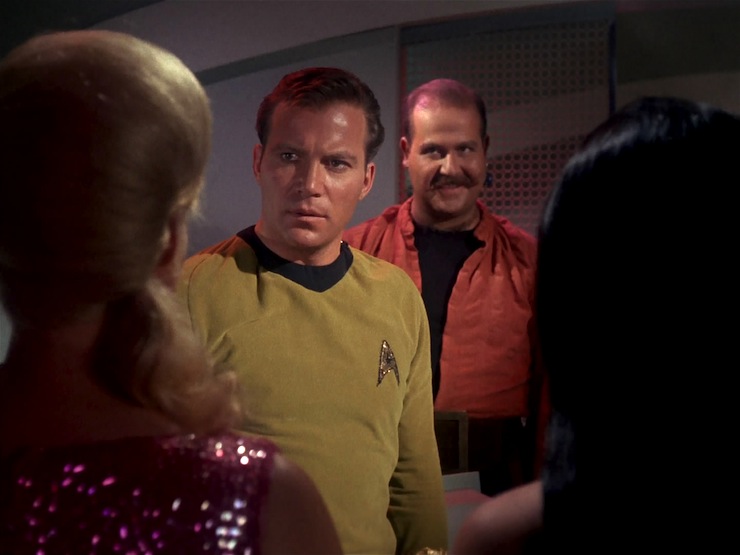
Spock, who has a somewhat amused look on his face at Scotty and McCoy’s adolescent idiocy, escorts Walsh and the three women to Kirk’s cabin, where Walsh explains to a gobsmacked Kirk that this isn’t his crew, it’s his cargo. Kirk also informs Walsh that he’ll be convening a hearing regarding Walsh’s actions and confines him and his “cargo” to quarters. When Walsh tries to reassure the women that everything will be all right, they keep trying to call him “Harry.”
Scotty can’t bypass the lithium crystals because they burned out the circuit array extending the deflectors around the cargo ship before it went boom. There’s a mining operation on Rigel XII where they can get new crystals. Kirk orders them to head there, then convenes Walsh’s hearing in the briefing room. He’s accused of travelling without a flight plan or an identification beacon, refusing to respond to hails, operating without a masters license (his license was expired)—and, it turns out, lying about who he is, as the computer identifies him as Harcourt Fenton Mudd, who’s been convicted of smuggling, counterfeiting, theft, and a number of other things. The ship he was on was supposed to be captained by Walsh, but he died, so Mudd assumed his identity. He’s in the business of wiving settlers—the three women were to become the spouses of lonely men on the frontier, and we remember again that this was filmed in 1966 when someone obviously thought it made sense to use “wife” as a verb.
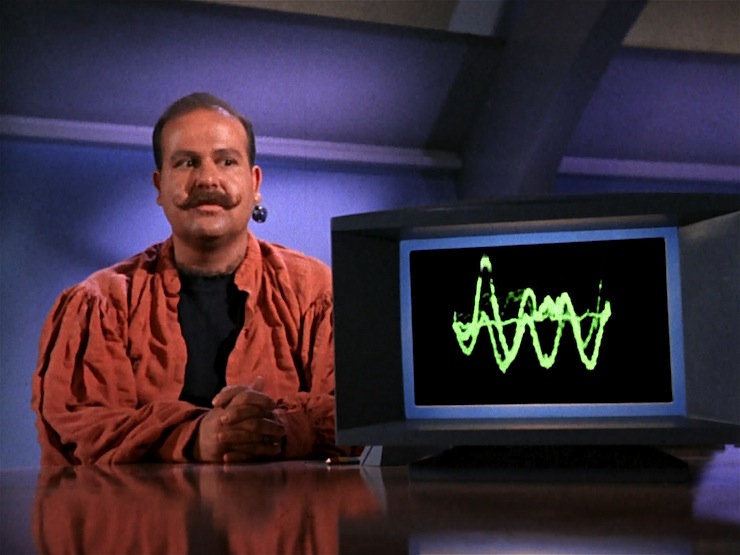
The computer has no record of the women, nor do sensor scans detect anything about them, though the computer does notice that the men on the hearing board are suffering from escalated body temperatures and blood pressure. One of the blondes, Eve, defends Mudd’s little operation, saying she was stuck on an automated farming world with the only company being fellow family members whom she had to clean up after.
When the final lithium crystal goes, Kirk orders Spock to contact the miners on Rigel XII and have them get the crystals ready instantly. Mudd is ecstatic—miners tend to be lonely and wealthy, and are the perfect marks—er, that is, clients for him.
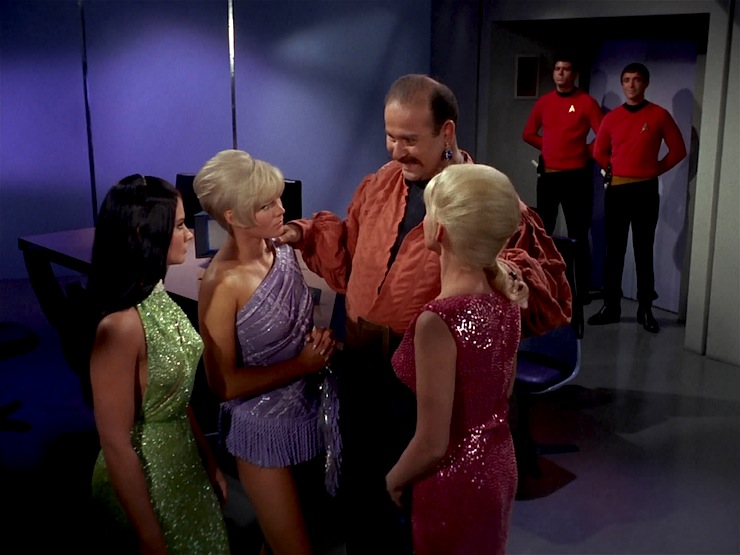
By the time they reach Rigel XII, the ship’s on battery power and will barely make it into orbit. Ruth comes to sickbay to flirt with McCoy, and her very presence makes the medical scanner go wonky. Meanwhile, Kirk finds Eve in his quarters uninvited. She admits to running in there to get away from the overwhelming attention of the male portion of the crew. She actually does a pretty good job of almost seducing Kirk, but at the last second she says she can’t do it, no matter what Mudd says.
We soon find out that Mudd sent each women to perform a task. Ruth’s job was to find out how many miners there are and how long they’ve been alone, while Magda gets the miners’ names and steals a communicator. Mudd contacts the mine and makes a deal. We also learn that the women are as beautiful and appealing as they are thanks to something called Venus drugs—which are wearing off, and it takes Mudd a while to remember where he hid them. After the women take the drugs (which look like glowy gummy vitamins), they go back to being soft-focused paragons of beauty.
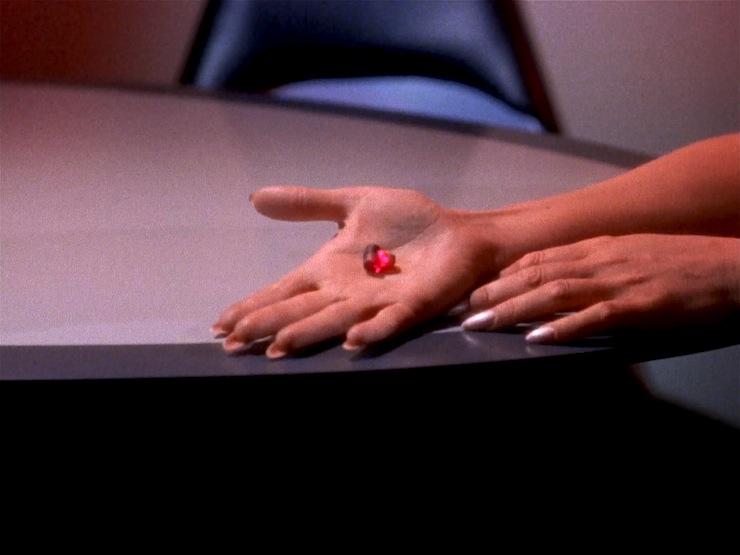
Childress and Gossett from the mine show up, and Childress makes it clear that the only currency he’ll accept for the crystals is Mudd’s women. Kirk refuses, threatening Childress with an aggressive lack of extraplanetary support from Starfleet, but Mudd calls his bluff, especially when the ship has to go to half-power.
Mudd and the women beam down. Ruth and Magda play along, dancing with the miners and generally trying to be as appealing as possible, but Eve is miserable, refusing to get into the convivial atmosphere. Childress—who refuses to give Kirk the crystals until he feels like it—abandons Eve and yanks Ruth away from Gossett. So Gossett tries to yank Magda away from Benton, which starts a fistfight. Eve, horrified, runs out into the magnetic dust storm outside, which will probably get her killed. Kirk, of course, goes after her, but they can’t find her on foot, so Kirk beams up to try to use the Enterprise to find her—and Childress, who also has been lost in the storm.
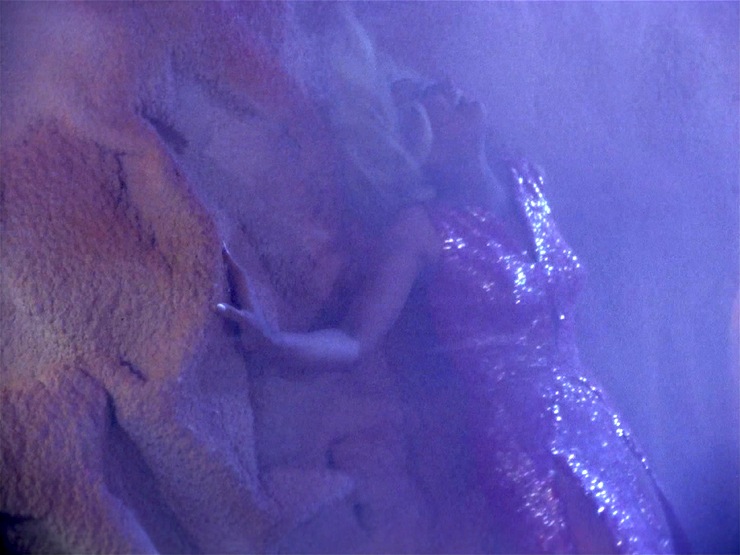
The ship has about five hours of power left. But even as they search, Childress actually finds Eve and takes her back to his man cave (okay, it’s really his quarters built out of a rock, but sometimes you have to call a spade a gardening tool).
Childress wakes up from a nap to find that Eve has cooked for him. They have a rather tense interaction, with Childress preferring his own way of doing things, making it even more clear that the only thing he really wants is someone to shtup. And then the drugs wear off, and Childress is even more disgusted by the plainer verison of Eve.
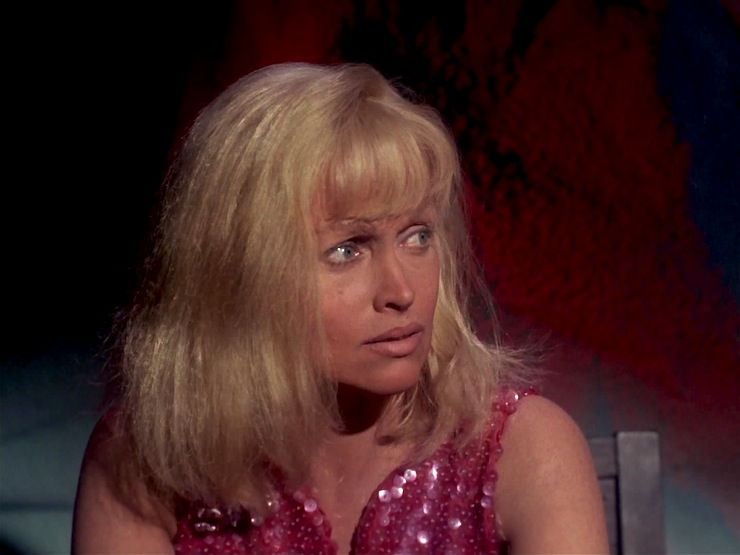
The Enterprise tracks Eve and Childress to the man cave and Kirk and Mudd beam down. Mudd admits that he’s used chemical enhancements. Eve takes the drug and asks if he really wants something pretty and vain or a woman who will actually cook and sew and do all those things that only women are fit to do and this is supposed to show what a good person she is and ACK!
Then Kirk and Mudd reveal that she didn’t take the drugs—they were gummy vitamins cleverly disguised as the Venus drugs. Apparently, she has the ability to put herself in soft focus and fix her hair without the use of pharmaceuticals. Childress agrees to provide all the crystals they need—and he would like to keep Eve around and talk to her.
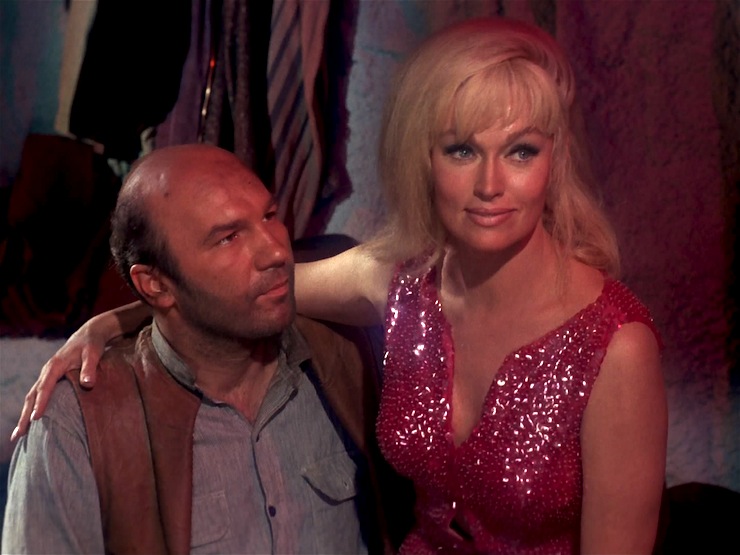
The ship is fixed, and off they go into the wild black yonder, with Mudd in custody, and Kirk offering to testify as a character witness at Mudd’s trial (to which Mudd’s reply is an appalled, “They’ll throw away the key!”).
Can’t we just reverse the polarity?: The Enterprise, at least in this episode, channels its power through lithium crystals, which sorta-kinda explains why a lithium-cracking station was so useful in “Where No Man Has Gone Before.” (This will soon be retconned to dilithium crystals.)
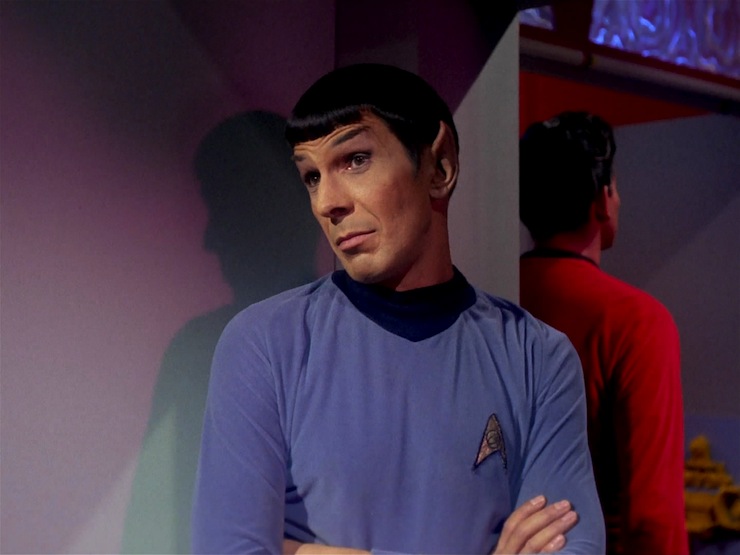
Fascinating: Mudd describes Spock as “part-Vulcanian,” the first indication of his father’s species. The fact that Mudd recognizes him as “part” just by looking at him indicates that the original notion was that Vulcans looked even less like humans than Spock does, if his halfbreed status was that obvious to a casual observer.
Still some remnants of shouty Spock, when he demands things from Mudd during the hearing, and he also spends a lot of the episode amused as hell at the way every male turns into a pile of goo in the presence of Mudd’s women. Seriously, look at that smile on his face when he brings Mudd to Kirk’s quarters, not to mention the swishy head tilt when he escorts the women out…
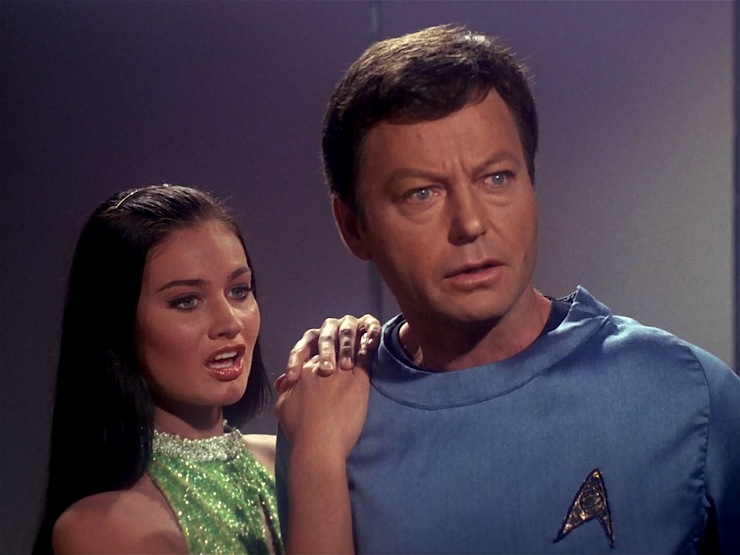
I’m a doctor not an escalator: McCoy is sufficiently kefluffled by Mudd’s women (especially Ruth) that he can’t even contrive an excuse to give them a medical exam (a lack Kirk chides him for), though he does notice that Ruth makes the medical scanner go flippity-flop.
I cannot change the laws of physics!: Scotty is able to get over his drooling idiocy in the transporter room via anger at his engines going to pieces.
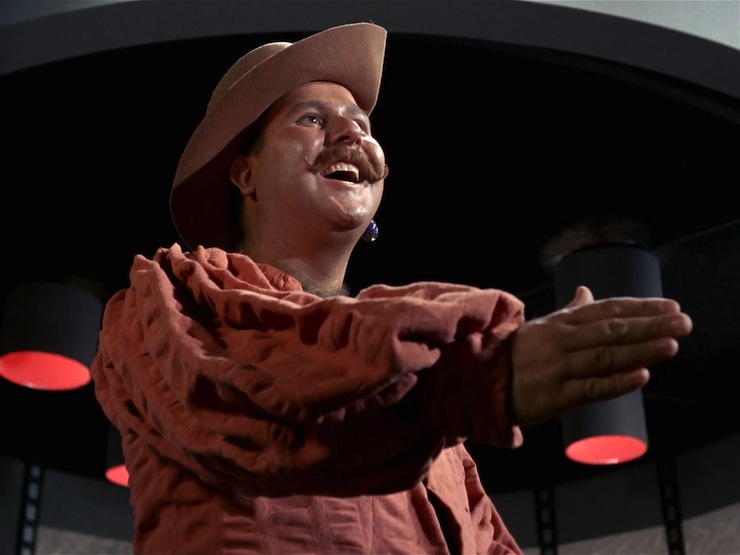
Go put on a red shirt: At least one, and often two, guards are on Mudd at all times. His attempts to get rid of them so he can speak freely in front of the women before the hearing fail utterly.
No sex, please, we’re Starfleet: The three women have a devastating effect on the men in the crew (except for Spock, though on him they have an indirect effect of amusement at the silly emotional people). When they report for their shift, Farrell is dazed and confused and Sulu, who’s also pretty taken but has his fecal matter together better, snaps him out of it.
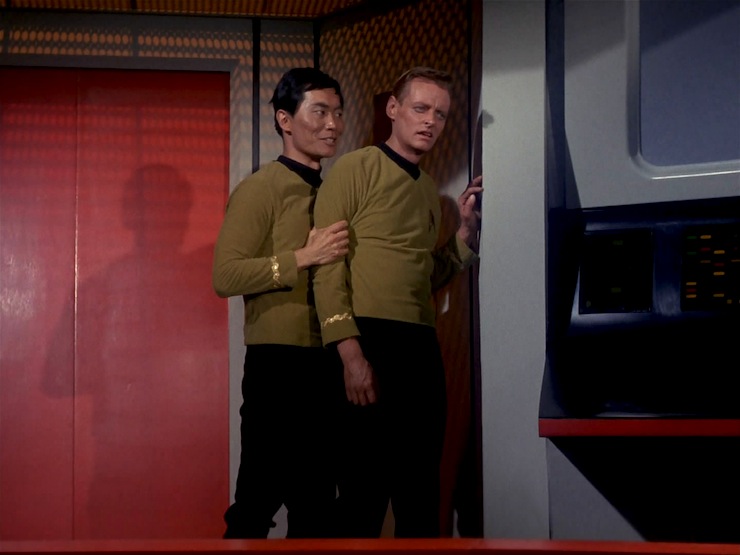
Channel open: “I read once that a commander has to act like a paragon of virtue. I never met a paragon.”
“Neither have I.”
Eve coming onto Kirk and Kirk being modest.
Welcome aboard: Making the first of three appearances as Harcourt Fenton Mudd is the great Roger C. Carmel, who will reprise the role in “I, Mudd” in the second season and “Mudd’s Passion” on the animated series. Karen Steele (Eve), Maggie Thrett (Ruth), and Susan Denberg (Magda) play the titular women, while Gene Dynarski (Childress), Jon Kowal (Gossett), and Seamon Glass (Benton) play the miners. Dynarski will twice return to Trek, as Krodak in “The Mark of Gideon” in the third season, and as Commander Quinteros in TNG’s “11001001.”
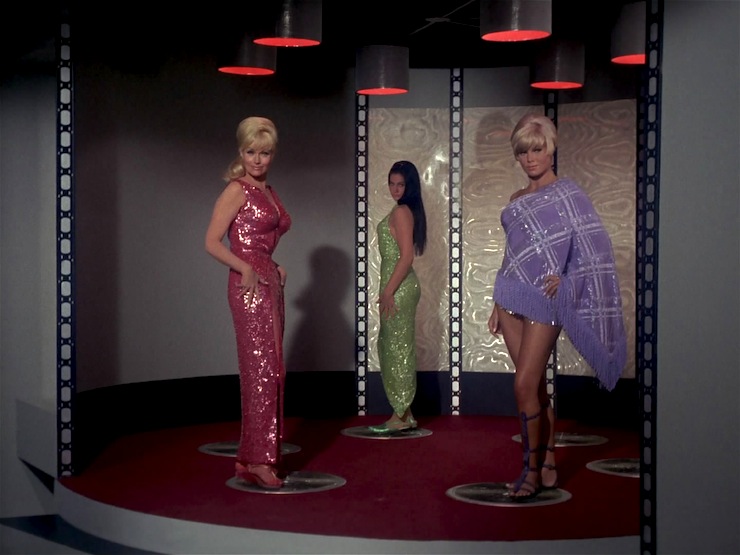
Plus we have recurring regulars DeForest Kelley, James Doohan, George Takei, and Nichelle Nichols, as well as Jim Goodwin, making the first of three appearances as Farrell.
Trivial matters: This was one of the three stories Gene Roddenberry pitched as a possible Trek pilot, along with what eventually became “The Cage” and “Return of the Archons.” NBC’s stated reason for not going with this pitch was that they didn’t want to lead with a story about a space pimp and his female slaves. Good instincts, NBC!
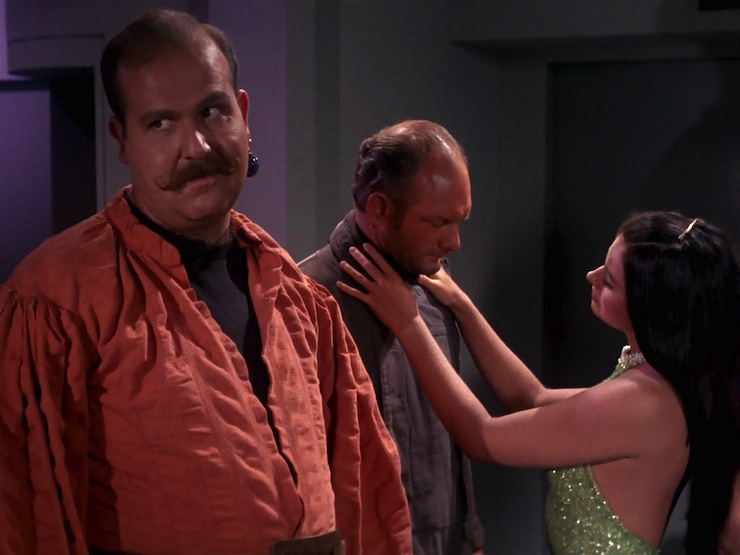
A lengthy monologue, that Roger C. Carmel was reportedly very proud of, in which Mudd tries to convince Uhura to take the Venus drug, was cut.
There was a reference in Star Trek Into Darkness to “the Mudd incident,” during which the Enterprise obtained the flitter they used to land on Qo’noS in that film. Said incident was chronicled in the comic book Countdown to Darkness by Roberto Orci, Mike Johnson, & David Messina.
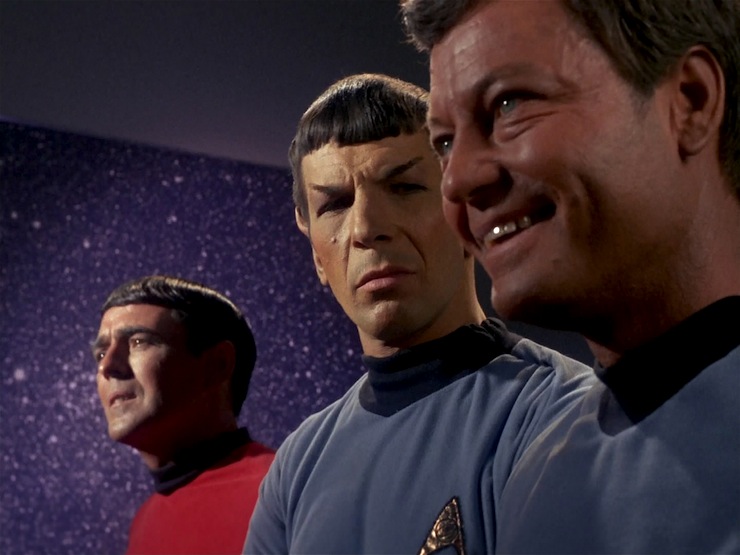
James Blish was contracted by Bantam to adapt the episodes of Trek into short story format. Most of those adaptations were published in twelve anthologies released between 1967 and 1977. The two exceptions were this episode and “I, Mudd.” Blish and Bantam’s intention was to release a thirteenth volume called Mudd’s Angels, which would adapt the two Mudd episodes and also include an original Mudd novella. Blish died while working on Star Trek 12, but his widow, J.A. Lawrence, completed her husband’s work, adapting “Shore Leave” and “And the Children Shall Lead” for that final anthology, and also writing all three parts of Mudd’s Angels: adapting the two episodes and writing “The Business, as Usual, During Altercations.”
Beyond the works mentioned in the previous two paragraphs, Mudd has appeared in plenty of other tie-in fiction, including the novels Where Sea Meets Sky and Mudd in Your Eye, both by Jerry Oltion; the final issue of Gold Key’s Trek comic; issues #39-40 of DC’s first Star Trek monthly comic by Len Wein & Tom Sutton; issues #22-24 of DC’s second Trek monthly comic by Howard Weinstein & Gordon Purcell; and the Star Trek 25th Anniversary videogame.
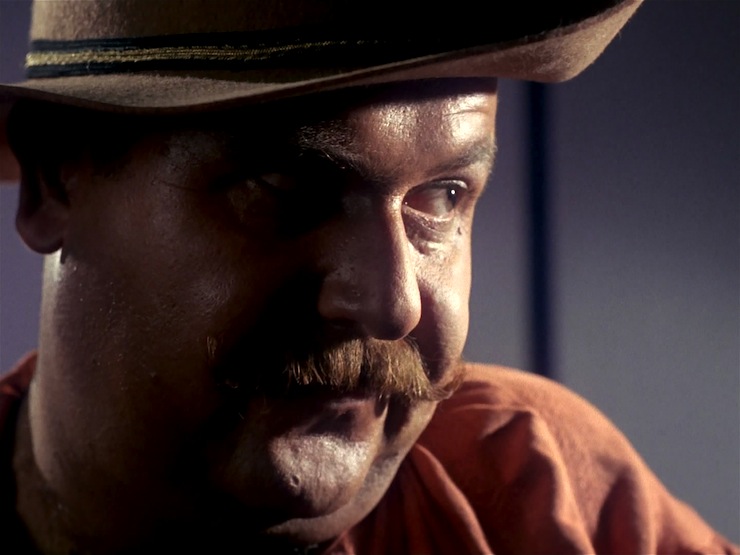
Plans for Mudd to return in the third season, in an episode entitled “Deep Mudd,” had to be scrapped due to Carmel being busy with film work.
Kirk identifies himself as “James T. Kirk,” thus exposing Gary Mitchell’s gravestone as a dirty dirty lie.
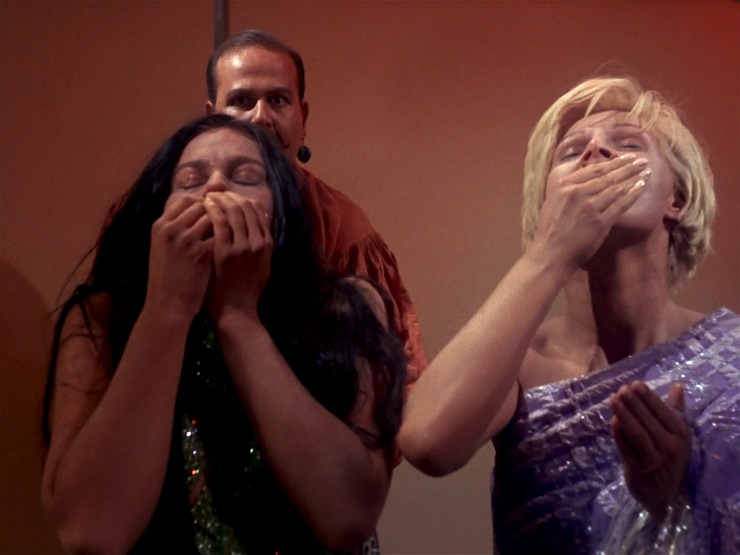
To boldly go: “This is me cargo.” I always liked the character of Harry Mudd, but that was entirely due to the joy and hilariousness of “I, Mudd” in the second season. I never had any interest in this episode, to the point that one time when I was playing FASA’s Trek role-playing game in college, the game master had someone show up with the name “Leo Walsh,” which was meant to be a hint to the players that it was Mudd. I totally missed the reference.
Watching it now, it’s like suffering through “Profit and Lace” all over again, though this story has a better excuse for its sexism than the Deep Space Nine episode. Not that it makes it any better. Mudd is, basically, a space pimp—what he’s selling is sex, which Eve all but comes out and says to Childress, limited only by 1966 Broadcast Standards & Practices not letting people use that word out loud. But the more “noble” calling that Eve yearns for is also to service a man, just in different ways: cleaning up after him, cooking for him, sewing for him, crying for him (yes, she really holds up crying for a man as a virtue). The fact that there are women assigned to the ship, many of whom are officers, is avoided like the plague (why aren’t there some women on the board of inquiry?).
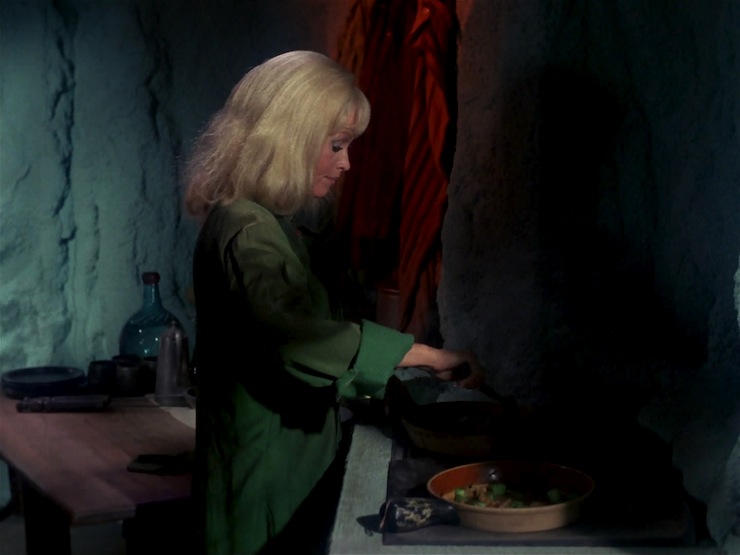
Plus there’s not enough story here for an hour. The initial chase of Mudd’s ship goes at a snail’s pace, there’s way too much time spent standing around with furrowed brows worrying about the ship, and there’s way way way too much time spent on lingering soft-focus shots of the three women and recycling the same closeup of Ruth staring seductively. Plus the whole “Leo Walsh” misdirect is utterly pointless, as the only purpose it serves is to a) drag out the plot and b) display the inadequacies of Roger C. Carmel’s Irish accent.
The episode gets a point for introducing one of the more entertaining characters in the franchise, but that’s all this sexist twaddle deserves.
Warp factor rating: 2
Next week: “The Enemy Within”
Keith R.A. DeCandido will be a guest at (Re)Generation Who this weekend in Hunt Valley, Maryland (along with Doctors Colin Baker, Sylvester McCoy, and, via Skype, Tom Baker, as well as dozens of other Who actors and writers). Exclusively at this con, Keith will have copies of the out-of-print Short Trips anthology Destination Prague at his table in Artist Alley, and he’ll sign and sell plenty of other books of his. His schedule is here.










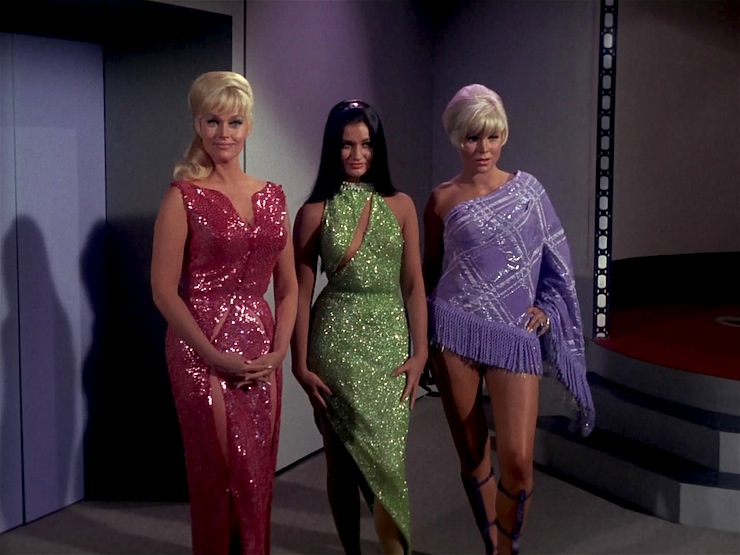
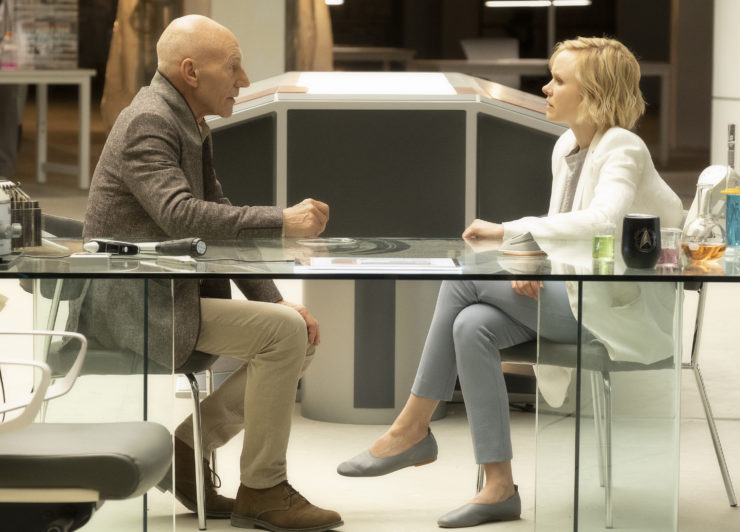
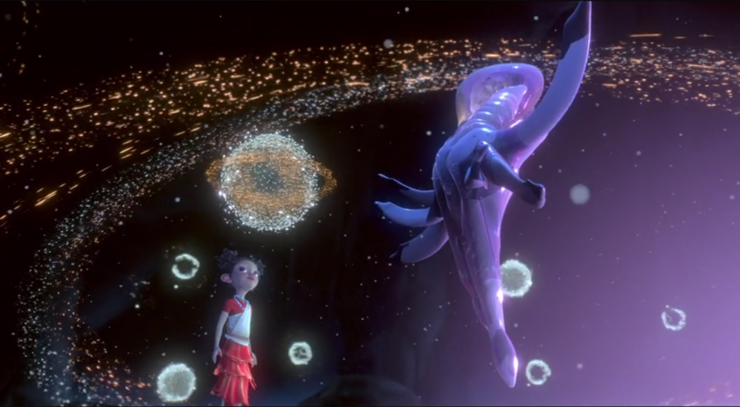
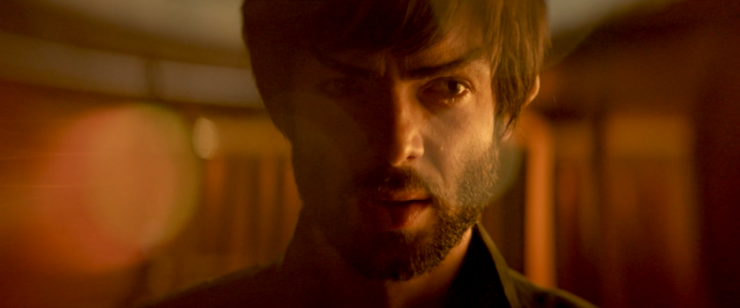
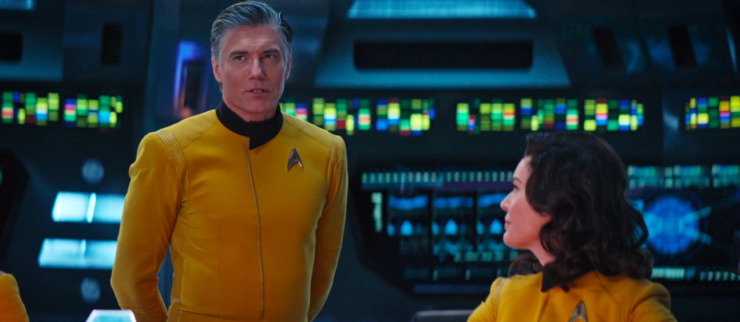
Mudd was entertaining, but geez louise, man that was some rampant sexism. While I’m glad they got rid of the scene where Mudd offered the drug to Uhura, I’d have paid good dollar to see her tear him a new one when he did.
Is it just me, or does Magda look like she’s wearing a carpet? Those tassles are a bit much.
Welp, thank The Great Bird of the Galaxy itself that we’ve got this one out the way. It is a story I rank worse than Spock’s Brain, and even the one with the hippies. Thank goodness we’ve only got to suffer the mustachioed fool one more time. I appreciate the sentiment behind the moral, that you are as worthwhile as you feel you are, but the execution and the whole…. Gah, nope, sorry. I’d rather watch the hippies again, Herbert.
Oh god this episode. Just so. I like Mudd’s appearance in I, Mudd better.
OH! OH OH OH! OHHHH! Mudd reappears in the latest Trek novel by Jeffery Lang! Great novel btw.
Picking nits, ‘to wife’ goes back to at least Shakespeare.
“And I have thrust myself into this maze,
Haply to wive and thrive as best I may:”
— Petruchio, Taming of the Shrew
Another trivial matter, Susan Denberg was a Playboy playmate the year this episode came out.
What’s interesting about this episode is Kirk’s portrayal. In contrast to our modern perception of Kirk as an inveterate skirt-chaser, here we see that he’s the only man aboard other than Spock who’s pretty much completely unaffected by the women. At this point, Kirk was still being written identically to Pike — an ultra-serious, driven ship commander who was married to his duty and wasn’t comfortable even thinking about women as anything but personnel.
And yes, the sexism. Even deeper than the assumption that the truest aspiration for a woman is to be a useful helpmate to her husband rather than a decorative bauble, there’s the assumption that colonizing space, mining vital resources, etc. is purely the work of men, with the women only coming along later as camp followers and mail-order brides. Of course, this was part of Roddenberry’s “space Western” approach to make a science fiction show palatable to Western-happy ’60s executives and viewers, but it does reflect some unexamined assumptions.
And we get our second example of ST’s inexplicable obsession with the star name “Rigel,” which they never used the same way twice. Also, we see that The Empire Strikes Back was not the first work of filmic SF to portray an asteroid field as an unrealistically dense obstacle course.
You know what? I have never found any of Mudd’s women particularly attractive, with or without the Venus drug. Maybe Ruth, kind of, but not that much. (Now, the Alices in “I, Mudd” were amazing.)
Speaking of the Venus drug, I offered an origin story for it in my Enterprise novel Rise of the Federation: Tower of Babel. I had the idea that someone might try to distill the essence of Orion pheromones/sex hormones and market it as a drug, and then I realized Trek canon already had a drug that did just what I had in mind. And that link between Orion women and Venus-drugged women illustrates Roddenberry’s preoccupation with the idea of female sexuality as an overpowering lure. (See also the Deltans in ST:TMP, especially in the novelization, since most of it had to be left out of the film to warrant its G rating.)
Surprising trivia: Even though Harry Mudd seems like a considerably older man than Kirk, Roger C. Carmel was actually a year and a half younger than Shatner. He was only 33 when this was made.
I was once at a trivia contest at a local mini-convention or something where the contest holders and 98 percent of the audience were convinced that Harry’s full name was Harcourt Fenton Mudd the Third. Nobody would listen to me when I tried to set them straight. I don’t know what gave them that idea, unless they were confusing him with Charles Emerson Winchester and/or Thurston Howell.
“I cannot change the laws of physics!” Or chemistry. I wish someone had never pointed out the fact that one cannot crack an element. Then again, maybe they will in The Future.
Not sure why Uhura refused the Venus drugs but she sure as heck didn’t need ’em! Like JamesP says, I would love to know what she said in response. Seems to have been sucked down the Memory Hole, though. The fact that the ep is so thin on content makes the fact that they deleted what Carmel thought was a rather substantive scene make even less sense.
Yeah Spock, i am glad you find involuntary behavior in response to reproductive urges so amusing…now.
I don’t despise this episode entirely, mainly because I try to view it through the lens of the decade it was made in, as Keith alludes to. It’s revolting, yes, but if you allow for the story to be about a pimp, it’s not a bad story about a pimp. Damning with faint praise, I suppose.
What I do take exception to, though, are the visuals. The soft focus, the ass shots, the pretty vs. ugly makeup, and – forgive me, Bill Theiss – the dresses, especially the blue one. You could have had the entire story exactly the same without any of that pandering crap, and it would have been the exact same story.
I’m pretty sure Gene Dynarski took the gummy vitamins himself, though, because aside from going gray, he hasn’t aged a bit by 11001001.
This was the first TOS episode I saw in my life, after The Cage. Needless to say, going from TNG to this was literally a kick in my senses, and not in a good way. This nearly made me give up on the Original Series. Sexist, slow-paced and boring.
Nevertheless, Carmel played Mudd reasonably well. And both Kirk and Spock manage to come out unscathed by this mess of a plot. At this point, Shatner had yet to inject more of his own personality into Kirk, who was still written as a by-the-book CO.
I think the biggest problem with the episode isn’t even the whole space pimp angle: it’s that it’s a story about guest stars. This isn’t DS9’s final season, where you could get away with an episode like Paper Moon. This was actually considered as a pilot.
James Blish was contracted by Bantam to adapt the episodes of Trek into short story format. Most of those adaptations were published in twelve anthologies released between 1967 and 1977.
I still own two of the James Blish adaptations (special editions translated to portuguese, released in the early 90’s). One book covered The Naked Time, Corbomite Maneuver, Where no Man has gone Before and The Man Trap. It also had a D.C. Fontana preface.
The other book contained The Galileo Seven, Court-Martial, The Menagerie and Shore Leave. Interestingly, The Menagerie story omitted the entire Kirk/Spock section and was basically The Cage.
Another episode that brings up questions about the whole “no money” in the future issue. The miners are ‘rich’, Mudd expects to make money from his schemes. The crystals are private property and the Enterprise could never just confisticate them even if they are all threatened with death.
Its also interesting to note that the writers thought a fully automated farming planet was more likely than fully automated housekeeping. So far both seem to be running neck and neck – and are both far ahead of interstellar travel.
I’m pretty sure Gene Dynarski took the gummy vitamins himself, though, because aside from going gray, he hasn’t aged a bit by 11001001.
@9: Ironically, the first TNG episode I ever saw was 11001001. With this and Mudd’s Women, in essence Gene Dynarski was basically the common link in my introduction to Trek. Needless to say, for all of season 1’s faults, that particular TNG episode warranted a 10. And Dynarski played Quinteros well.
I just hate this episode. As a gay man, nothing makes me feel more left out than Gene Roddenberry’s obsession with female sexuality. Episodes like this make it clear that I’m *completely* outside the audience. Fortunately, the vast majority of Star Trek isn’t anything remotely like this, but still. This kind of material always makes me feel like a kind of alien impersonating as a human man.
@7 A crystal made out of an element eg. a diamond, can be cracked.
In fact I disliked this episode so much that I skipped I, Mudd in my recent marathon (a watch, not a re-watch), and don’t have plans to go back and correct the omission.
@10/Eduardo: “I think the biggest problem with the episode isn’t even the whole space pimp angle: it’s that it’s a story about guest stars.”
The thing is, in ’60s TV, that was a feature, not a bug. As I discussed in the “Corbomite Maneuver” thread, most ’60s TV dramas aspired to an anthology-like model, with each episode being a complete, self-contained play in its own right. So a lot of shows were designed to revolve around the guest stars of the week, characters who could go through real change and growth in the course of an hour while the regulars stayed unchanged. The Fugitive and its imitators are the classic examples, with the hero getting caught up in different characters’ problems every week and helping them solve them.
Today, when we hear that Roddenberry pitched ST as “Wagon Train to the stars,” we assume he just meant it was a Western in space (which was probably part of it), but mainly it was shorthand to tell executives that he wanted to use the same format as the successful, critically acclaimed Wagon Train, a show that focused on a different guest star as a member of the wagon train every week, and even named most of its episodes “The (Guest Character) Story.” A number of early TOS episodes revolved around the guest stars — “Where No Man” was largely about Mitchell and Dehner, this is about Mudd and his women, “Charlie X” speaks for itself.
@11/bookworm1398: The “no money” thing didn’t originate until The Voyage Home and wasn’t developed further until TNG. In TOS, they quite clearly did have money and commerce. Indeed, we saw it as late as The Search for Spock, with McCoy trying to buy passage on a ship and explicitly saying “Money I got” to the backward-talking alien pilot. So I always took Kirk’s line in TVH about not having money to mean simply that people in his time didn’t use paper currency, instead relying on an electronic credit system (the “credits” spoken of as a currency in “The Trouble With Tribbles”).
Eduardo: I’ll be addressing this again and again in this rewatch, but Kirk’s reputation as a maverick who doesn’t play by the rules and goes his own way is entirely an artifact of the movies, mostly the third one. In fact, throughout the TV show, Kirk remains a by-the-book captain. The only time he disobeys orders is in “Amok Time,” and that was a special case.
—Keith R.A. DeCandido
As a homely little kid watching this back in the 60s, I really liked how Eve was beautiful when she just *thought* she had taken the Venus drug. Looking back on it reveals that the episode has wincingly sexist plot line — but that message about beauty is still there. If you think you are beautiful, and carry yourself that way, other people tend to see you as beautiful. Of course, soft focus photography helps, too…
@11
http://en.memory-alpha.org/wiki/Money
@17. I always wondered where this idea that Kirk was some maverick rebel Captain came from and just assumed it was some pop culture thing, because in TOS he seemed pretty by the book and tried to do the right thing honestly the only 2 times he was any kind of maverick was Trek 3 and 4. And it was still for the right reasons. So never got the ‘Kirk is a hotshot rebel!’ thing. With Nu-Trek I guess he is now. But still.
Will not be rewatching this episode, though the next episode, Enemy Within, is pretty good.
“Where No Man” was largely about Mitchell and Dehner, this is about Mudd and his women, “Charlie X” speaks for itself.
@16: But unlike Mudd, those two other shows were very much about Kirk and how the plot affected him. No Man was about Kirk grappling with the dilemma of killing Gary Mitchell, his friend and colleague, while Charlie X has Kirk using his command authority to impose limits on the boy. In this episode however, Kirk’s primary concern is to refuel the ship rather than the women (I’ll grant that he risked his life in the magnetic storm to find Eve).
@17: I wasn’t referring to Kirk’s actions as a maverick (which the Abrams films also delved upon). I was referring more to his demeanor. In these early episodes, Kirk was too strict even by TOS standards. For instance, in Tribbles, Kirk is way more casual than he was in the first season, particularly in his dealings with Nilz Baris. A Piece of the Action is another good example of Kirk feeling comfortable with the mission.
This episode also provided fodder for one of the Star Trek Blooper Reels. The scene they chose from this has stuck with me for the many years since I first saw it, although I’m not really sure why…
@@@@@ 1:45 if you want to skip ahead, but really you should watch the entire thing…
https://www.youtube.com/watch?v=8N9o8Abr0bQ
@17: If you count Prime Directive violations, then Kirk’s pretty much a hardened criminal….. And there are times when he’s pretty contemptuous of civilian authority, such as Commissioner Ferris in “The Galileo Seven”, and Under-Secretary Baris in “The Trouble with Tribbles.” He does his duty, but he makes it clear he will do the absolute minimum he can get away with.
Plus he has a habit of giving away habitable planets without getting the Federation’s approval… to Khan, to the Kelvins.
This episode alone tells volumes about Roddenberry’s perception of women and what to think of his supposedly brave fight to include a female first officer. He just wanted to promote his girlfriend.
I’m stunned that he really suggested this drivel as a pilot episode. If a potential show runner would present me first green female sex slaves and then a plot about women as sex objects, drooling men, pimping and so on, I’d have my serious doubts if this man is able to put his personal obsessions aside for th ensuing production.
What I find extremely disgusting is the dishonest saintly “beauty comes from within” coda after the whole episodes drools over the women’s asses. Not to mention the fact that this makes no sense whatsoever and was probably added as some moral afterthought. Also are the drugs are supposed to have also some kind of effect on the men by whatever means or why are all drooling like complete idiots?
This episode remarkably manages to tick off literally every sexist cliche in the book, we have a loveable rogue pimp, women as sex objects or as housewifes, women casting spells on poor men with their beauty, the final match between men and women but only after their beauty is (somehow) restored and on and on. Quite an achievement.
I also find – with all due respect – the three actresses a rather bizarre choice for women of overpowering beauty. In a series which regularily presented knock-out beauties a la Leslie Parrish or Celeste Yarnall the three aren’t really convincing casting, Steele never was a particular beauty and looked rather harsh at 35 while Denberg never looked worse than with this hairstyle.
I agree about the western tropes here which totally don’t fit the established environment at all, the whole pioneer woman who cooks, mends clothes and washes is utterly absurd and unintentionally funny in this context.
I really despise this piece of s***.
There’s one good thing about this episode and this is Harvey Hart’s direction which is inventive, but unfortunately he needed too much time and camera cut the film in advance so he was never invited back, so faster hacks like Marc Daniels were used. But notice e.g. that the three women after the rescue beaming are lined up in one shot totally out of continuity to complement the three men and generelly look out for the camera placements and moves
I find it particularly interesting that this discussion includes comments calling the women in this episode unattractive. Yes, their characters are supposed to be beautiful – but what about their acting skills? Why, even today, do we discuss one and not the other?
This episode is pretty much a historical western romance converted to space.
A lot of the stuff people seem to be complaining about comes straight from that genre, especially the choice between useful or beautiful. That’s the classic choice in HHW romances. As is the whole “mail-order bride” scheme that Mudd is carrying out.
It seems a little harsh to condemn Star Trek without even acknowledging the source genre and commenting on it.
@25 That’s a nice politically correct statement, but it’s also plainly wrong. The role descriptions demand extremely attractive actresses and if the casting doesn’t correspond the viewer’s suspension of disbelief fails and he is distanced from the proceeedings. And there’s no way an actor can compensate via acting for looks. Sure you can bring an intelligent expression or raw sensuality to the role, but there are limits.
The same obviously applies to height, weight, ethnic type, whatever the role requirements are.
@26 Chris and me we both acknowledged the transposition of Western themes to Sci-Fi. But it should have been blatantly obvious to Roddenberry that the mail order bride story who washes, cooks and mends the socks is totally out of place in a Sci-Fi setting. These moments are so embarassingly cringeworthy I’m always tempted to hit the mute button every time they creep up in the episode.
Lubitsch @27 – I’m not saying we shouldn’t talk about their beauty. Like I said, the characters are supposed to be beautiful. I just find it interesting that, in a discussion of sexism in the 1960s vs sexism today, we are still focusing solely on their beauty, to the exclusion of other issues. I wasn’t trying to be politically correct – I was just noting something I found interesting, and seeing where the discussion would go from there. You made an interesting point about my comment. I think it’s a good discussion to have, analyzing how we respond to certain elements of a show. :)
I’ve said Firefly is the Star Trek universe from Harry Mudd’s POV. I probably got that from someone else.
A little off-topic, but I thought I’d mention that there was, starting just a couple of years later, an entire television series dedicated to the idea of “bringing women/wives” to the manly men exploring the frontier.
That would be the classic, “Here Come the Brides,” _very_ loosely based on real events from US history (efforts in 1864-6 to bring eligible women to post-Civil War Seattle to marry men working in the logging and fishing industries).
“Here Come the Brides” starred Robert Brown, David Soul (later of “Starsky & Hutch” fame) and Bobby Sherman (perhaps best known as a teen idol/singer). There were more than 50 episodes, which for a time seemed to be on perpetual re-run.
The best part of the episode is Mudd trying to give a Clintonian spin to the events that led him to being a prisoner aboard the Enterprise and Kirk making the on the spot translation.
While Harry is oily and utterly amoral, the women are there of their own free will who are doing this for their own reasons. Frankly, the mail-order bride thing could work (it would not be out of place in Firefly, for instance). Frontiers are harsh, even in a Sci-Fi setting. The notion that a woman wanting to be housewife is settling for something beneath them is harshly judgemental.
@28 – The major plot point of the story is that the drug makes the user appear to be extraoradinarily attractive to the opposite sex and there are more beautiful guest stars upcoming (Andrea and Helen Noel come to mind). On the other hand, McCoy does hang a lampshade on it by seriously questioning if his perception is reality. Maybe the intent was for the audience not to quite see them through the same pheromone fogged glasses our protagonists were.
@23/Sidereal: By the stricter interpretation of the Prime Directive in the TNG era, maybe Kirk would seem a “criminal.” But TOS was in an era where the captain of a starship might be the highest Federation authority on hand to make a critical decision, and thus had a lot more leeway than in TNG when a Starfleet admiral could Skype in at a moment’s notice. The Prime Directive wasn’t so much an absolute straitjacket as a guideline subject to the captain’s judgment and interpretation.
Just about every time Kirk interfered in another culture, he was acting to cancel out someone else’s interference, to eliminate it or to mitigate the damage. So he saw his actions as upholding the PD rather than violating it. The one time I think he blatantly ignored the PD was when he rescued Eleen in “Friday’s Child,” when even she was prepared to die by the customs of her people. But we’ll get to that in due course.
@24/Lubitsch: I don’t think the treatment of women in these early episodes was all that unusual for ’60s TV, though. Try watching The Man from UNCLE sometime — it’s not only chauvinistic and ogling toward its female guests, but often downright misogynistic. So the execs wouldn’t have seen Roddenberry as someone with problematical hangups — they probably would’ve seen him as a virile man’s man who loved the casting couch as much as they did.
@28/MeredithP: No, the episode focused solely on their beauty. That was Ruth and Magda’s sole purpose in the story — to be irresistibly gorgeous. They didn’t really do much acting. Eve was the only one that was any kind of an acting challenge.
@29/Del: Whereas I think of Firefly as Star Trek from the Maquis’s point of view. Well, if they’d lost to the Federation rather than being wiped out by the Dominion.
@30/masinger: Interesting you should mention Here Come the Brides (which also starred Mark Lenard), since there’s a Trek novel called Ishmael by Barbara Hambly which is an unauthorized crossover between Trek and HCTB, with Spock losing his memory and going back in time to the era of HCTB, where he’s taken under the wing of Lenard’s character. It also contains cameos from various other Western and science fiction series’ characters.
@31/Crusader75: I’m not being judgmental toward homemakers of either sex. I just find it implausible that no women would participate in opening a 23rd-century frontier except as spouses. Where are the female miners? Why isn’t someone “husbanding” settlers too?
@33 I could have sworn in one episode that Kirk explains to someone (captain’s log, maybe?) that violating the prime directive carried the death penalty…
@34/FSS: Absolutely not. Only General Order 7 in “The Menagerie” (misreported as GO 4 in “Turnabout Intruder” carried the death penalty. You must be thinking of Kirk’s line from “The Omega Glory” that “A star captain’s most solemn oath is that he will give his life, even his entire crew, rather than violate the Prime Directive.” Self-sacrifice is hardly the same thing as execution.
But again, though, Kirk believed his actions were upholding the Prime Directive by interfering to remove or mitigate another source of interference, to put a culture back on track to a life of autonomous self-determination after someone or something had taken it from them. We only see it as violation because we’ve been conditioned by TNG’s far more absolutist interpretation of the PD. Kirk was deeply committed to the PD, but as applied to everyone, not just himself. He’d keep his hands off if he could, but if someone else wasn’t keeping their hands off, he’d enforce their non-interference through his own, ideally temporary, corrective interference.
@33 – I don’t think the story says there are no such things as women miners, just that the three miners on this planet are all men. However, men do choose those types of occupations at a much greater rate than women. I believe there is a big male over female gender imbalance right now in North Dakota as a result of the current oil boom there. If there is that type of large difference in population between men and women, a single woman interested in men in that location probably is not going to need the services of a “husbander”, is she?
Plus, given Harry’s personality, he I doubt he’d be interested in that type of “cargo”.
All I’m suggesting is we examine how we analyze an episode – what biases, knowledge, and frameworks we bring to it. I include myself in that; perhaps the reason I’m not as offended by the episode as others is because I’m too willing to play the relativist and excuse the show because it was made in the 1960s.
If the episode is about beauty and is sexist, and we are discussing beauty, are we not then also sexist? This is not an accusation, it’s a discussion question, to examine how we view a 1966 show in 2015.
The episode seemed to hint, but never came right out and said, that the drug was the cause of Dr. McCoy’s equipment acting up. It looked and felt like an untied loose end.
It was also never shown how Mudd eventually got caught. Presumably explaining that would have taken too long and made the episode drawn out more (not that it could have been much worse).
I never heard about the cut scene with Mudd trying to get Uhura to take the drug until this rewatch, but I thought about a cool way that these elements in the story could have been tied together.
Mudd tries to push the drug on Uhura. She pretends to accept it, but actually takes it to Dr. McCoy to have it analyzed, and it sets off his equipment just like before. That ties up all the loose ends and sets the stage for Kirk to confront Harry and confiscate the drugs.
On the whole “Kirk the rule breaking maverick” thing, I agree there is not much support per se. I think what it is, is that the “rules” of Star Trek in the TOS era give a lot more latitude to individuals than they so by the TNG era. Not only that, Kirk clearly has the authority to interpret the rules in different ways too (when he bumps up against civilian authorities), he has a tendency to rules lawyer things. For actual rule breaking, I think Spock trumps Kirk in that regard. It has been a while since I did a proper rewatch, but I’m certain that McCoy has taken glee in pointing out Spock is breaking the rules, more than once.
In-universe, it certainly seems reasonable that Kirk has less constraints on him than Picard. Apart from space-exploration still being fairly new in that era, and with a lot more unexplained phenomena in it, in Kirk’s original voyages era Starfleet still doesn’t have the complete instantaneous communication that it does by Picard’s time. The admirals in Picard’s time can effectively micromanage every mission live as it happens, and we all know micromanagement means more rules and less personal autonomy, in the TOS timeframe that doesn’t come into play until the movies. In the series there are still multiple instances of being out of range, or having to wait hours or days for a reply. Kirk has to be able to play things by ear and have a wide ranging remit.
I’m with Merideth. It seems pretty clear to me to that saying the sexist episode doesn’t work because the actresses are too ugly is the kind of statement that definitely requires examination. I think the point of view that if we move the goalposts to within the sexist framework of the script, it doesn’t make sense… makes sense. But it’s not clear to me at all why we need to do anything of the sort.
@9: What blue dress? I see, pink, green, and white & gold.
In all seriousness, though, it’s purple.
@36/Crusader75: Maybe today there are more men in the field than women, but expecting a science-fiction future to duplicate today’s conditions makes no more sense than expecting it to duplicate 1966 conditions, or Old West conditions.
@37/MeredithP: Acknowledging beauty is absolutely not sexist in itself. What’s sexist is to ignore everything else. As I said, it was the episode itself that set the terms: These women’s entire reason for existence, in the story, was to be overpoweringly beautiful. The men in the crew weren’t going gaga for their intelligence or their engineering skills. Their purpose in the story, as written, was to be beauties. All we’re doing is responding to how the narrative itself defined and positioned its characters.
Try an analogy. Say that a character’s exclusive role in the story is to be the world’s greatest opera tenor, and they cast a performer who’s just a mediocre opera singer. Would it be prejudiced to comment on the fact that he wasn’t as great a singer as advertised? Or would it simply be calling the casting into question?
And @40/GarretC, nobody is saying the episode fails because the actresses are less attractive than claimed. It’s just an incidental observation, a trivial side point.
I just caught a rerun of Airplane II on television! Now I realize it’s with the character of Murdock that Shatner became Shatner 2.0, indulging his comedy side full throttle, and taking theatrics to another level.
I believe he did this film right after Wrath of Khan.
Trivia: Beyond Star Trek, Susan Denberg is also known for playing the female creation in the Hammer horror film, “Frankenstein Created Woman.”
@42: You’re right in your response to me: it’s clear that the consensus is the episode fails for plenty of other reasons, and I admit to framing my comment in a more reductive way than was necessary, but I think your response to Merideth also touches on my point of view here: You say that it’s the episode the sets the terms, and my question is why should we agree to a bad set of terms in the first place?
You also say, correctly I think, that acknowledging beauty is not sexist in and of itself, but my question there becomes is that really what we’re doing? It sounds more like an acknowledgment of insufficient beauty, which is a sufficiently different thing to give me pause.
@24 It is sexist drivel. It’s also the 60s. Most television in the 60s was sexist drivel.
I think this episode reflects a certain fear about making a science fiction television show. They aren’t sure that anyone will watch the show, so they make an episode with hot babes and implicit sex. Since only boys are interested in science fiction, this should be a perfect way to atract their attention.
I understand the show runners were rather astounded when the show was popular with women, and that the women were attracted to Spock instead of Kirk (who loses his shirt in every. single. episode.).
Not a favorite episode, for all the reasons mentioned above. Also, one very minor but always niggling nitpick: When the camera cuts to McCoy’s reaction on first seeing the women (even the title of the episode is sexist), he is wearing his medical smock and is clearly in sickbay, not the transporter room. Bugs the heck out of me every time.
Also, there is no way the camera should be able to get the shot it does of the three women standing “pretty maids all in a row” while they are still standing on the transporter platform (if memory serves).
I have not read the JJ-verse comic that revisits and, as I gather, reimagines Mudd. I think the point Crusader raised @31 above, that the women were doing this of their own free will, might make an interesting angle into rewriting this story for less 1960s sensibilities. I tried to write a “biography” of Mudd for TREK magazine back in the day, but I was just a teenager, I am sure I didn’t pick up on that. (I did, however, postulate that Mudd murdered the real Leo Walsh to get the ship. Looking back, I don’t think Mudd is quite the murdering type.)
This is probably nobody’s favourite episode.
Since I wrote in one of my comments on The Corbomite Maneuver that Star Trek never felt sexist to me when I was a teenage girl I should add that this episode wasn’t aired in Germany before 1987.
When I finally got to watch it, well, I was baffled.
I haven’t seen this episode in a long time and have never been tempted to rewatch it. Beyond the silly sexism, I remember it being a fairly dull episode—apart from Carmel’s performance of course. But if I’m going to watch a Harry Mudd episode, I’m going with “I, Mudd.”
@42- Expecting a science fiction setting to conform to certain ideological expectations about human nature and proclaim it bad sci-fi if it reflects other notions about the human condition is not sensible in itself.
The reasons why men and women choose on the average certain jobs over another may be innate and not subject to change..
@50/Crusader: I’m not the one expecting the setting to conform to anything. I’m just saying it’s a failure of imagination to assume you can apply present-day standards to the future, whether that present day is the 1960s or the 2010s. You spoke of present-day gender balance in mining as if it proved that the story’s far-future scenario was plausible, and I’m saying that it proves nothing.
And very few behavioral gender differences are innate. Most differences that societies have assumed to be innate are really cultural. Heck, the whole reason we find this episode sexist today is because we’ve recognized the gross folly in its assumption that women were innately suited for homemaking and childrearing above all other roles. How arrogant it would be for us to assume that our 2015 gender assumptions are any more trustworthy than the assumptions people 50 years ago took for granted. In 2065, our grandchildren may look back on us and ridicule the narrowness of our expectations.
Personally, I always thought the most jarring part of this episode was the discovery that they have a drug that can render you hypnotically beautiful and that most people aren’t using it.
Even if it only works on women, that is still a pretty big market.
ad @52: Isn’t there a line about it being illegal?
After years, this review finally crystalized the pacing problems with this episode. I always had the impression that it was considered something of a classic among ’60s-’70s fans, and I never really understood why people seemed to enjoy it more than I did.
@52/ad: If I used it, all the men around me would become somehow dazed and unable to carry on an intelligent conversation. Doesn’t sound like fun.
As for the whole “Is it sexist to talk about their beauty?” thread, I’m not going to claim to understand what Meredith’s full point was, but I kind of get the notion. Yes, I also understand what people are saying about the women not fulfilling the described role…I also don’t find them to be blindingly attractive in that I’d totally lose my wits, and as other people pointed out, there are more attractive guest stars coming up on this very show. However, there is the question of whether we are judging their beauty upon a certain set of societal standards vs. something that is somehow innate. If part of the point of the episode is, “beauty comes from within,” or “beauty is in the eye of the beholder,” then I kind of feel like it’s going against that to fail to imagine that there isn’t someone (in the future, as it were) who would be totally into these women even though we aren’t.
And I don’t know if this is societal conditioning or not, but the hairstyles and wardrobes really don’t help their attractiveness. Actually, I’m mainly talking about the purple rug/curtain/tablecloth thing that Meredith pointed out. I mean, should some of the fabric from the sleeve have been used in the skirt? Did the (in universe) designer forget to put in clearly defined armholes and tags and she’s actually just wearing it sideways? Is it actually just a picnic blanket that she grabbed at the last minute because her real dress got destroyed?
The other thought I had about this episode is that if Mudd had been born a hundred years later, he wouldn’t have a market for this scheme. The miners would have replicators so they wouldn’t need anyone to sew or cook, and holodecks so they wouldn’t need anyone to, ya’know.
@53/Meredith: You are correct. “Oh, it exists, illegally,” quoth Kirk.
Which establishes an illegal drug trade in the 23rd century, which opens the door (in theory) for the drugs being sold in the first draft of “City on the Edge of Forever.” I guess the difference is, in “Mudd’s Women,” it’s not Starfleet personnel trafficking in drugs.
@55/Jana: Nice!
I loved the way, Keith, you summed up the change the colored gelatin works on Eve at the end. Sexist or not (though it is), that moment just completely baffles from any logical standpoint.
I think nearly everybody agrees that this was TOS’ first true stinker. The sexism is bad enough, but what is even worse is that the story just wasn’t interesting or entertaining. I would rate it as a ‘1’.
And I’m completely awe-stricken by the fact that Roddenberry actually considered this episode as a pilot for the entire series. I mean, what in the name of the Great Bird was the Great Bird thinking?!
@8 / Crusader75: “Yeah Spock, i am glad you find involuntary behavior in response to reproductive urges so amusing…now.”
Hee hee… That’s just hilarious. Oh, the delicious irony. You, sir, have just made my day.
@52/ad: It doesn’t just work on women. As Harry puts it, “Well, what it does is give you more of whatever you have. Well, with men, it makes them more muscular. Women… rounder. Men, more aggressive. Women, more feminine and…”
So basically a hormonal amplifier, I guess.
@57/Mike: I think I read somewhere the “Dumbo’s feather” effect that the placebo drug had on Eve at the end was what made the network willing to accept a story about drugs in the first place — the implication that it was more about inner self-confidence made the drug seem less powerful and desirable, I guess.
@6 – Also, we see that The Empire Strikes Back was not the first work of filmic SF to portray an asteroid field as an unrealistically dense obstacle course.
How many asteroid fields do we on Earth currently know about? Is it just the one inside our own solar system? I’m just curios if we know enough of them to assume they are all the same and there are none that are dense obstacle courses? I can see how it can be cliche in sci-fi though.
The episode’s treatment of providing wives to miners fails to parallel the historical realities of the practice.
Historically, the men would open the frontier, and the women would follow, the idea being that they would raise families in the lands they opened up for themselves.
Due to the relative uninhabitability of the planet, no such opportunity exists for the women in this episode. Had Mudd been providing wives to terraformers, we’d have a suitable science fiction equivalent, and we could discuss the relative morals and ethics without using the words “pimp,” or “human trafficking.”
I am a fan of accurately portraying outdated values in media. This episode failed to do so, and instead made it a caricature.
And does anyone believe that lonely miners in a remote corner of the galaxy would actually reject plain-looking women? That’s perhaps the most demeaning aspect of this episode.
@59/Christopher: I don’t doubt you’re right, but Dumbo didn’t objectively change his physical appearance. I mean, his ears stayed the same size, whether he flew or not. It just makes no sense.
@61/lerris: The shift from mining to terraforming would have been interesting. Nice comment.
Another thought that occurs to me about this episode: Are Childress and the two others the only three miners on all of Rigel?
@60,
A dense, obstacle course-asteroid field would tear itself apart or smash itself to powder due to gravitational influences.
@60/Captain Sheridan: Actually we have detected and imaged protoplanetary disks around numerous other stars, and those are basically “asteroid fields.” And yes, some of them are hundreds of times denser than ours — but the thing is, our Asteroid Belt is so diffuse that the average distance between two asteroids is 16 times the distance from the Earth to the Moon. You could fly through it a dozen times and never even see an asteroid with the naked eye unless you specifically aimed for one. So a belt a hundred or a thousand times denser would still be indistinguishable from empty space.
And of course physics works the same everywhere. Any field of asteroids as dense as the ones in TESB and other sci-fi would soon be drawn together by the mutual gravity between bodies and collapse into a single big asteroid or a planet — if it didn’t disintegrate or dissipate as StrongDreams suggests. So they could exist at that density, but would be such fleeting, short-lived phenomena that the odds of encountering one would be extremely low. If it happened, it’d be a once-in-a-lifetime event, not the norm for every single asteroid field in the universe.
Now, a ring system like Saturn’s is similar in density, but also very flat, so you could easily move out of the plane of the rings, making it not much of an obstacle course.
@61/Lerris: There’s an old SF story along just those lines, “The Girls from Earth” by Frank M. Robinson, published in January 1952. It was also a sci-fi riff on the old practice of wiving settlers, and it also involved a fraud in which the scammers replaced the photos of plain women from Earth with photos of starlets and models to lure in the men on Mars. It was adapted on the X Minus One radio show. I think its ending is more realistic along the lines you suggest, although still rooted in chauvinistic gender assumptions.
@62/Mike: I’m not disagreeing with you about Eve’s magic transformation. I’m just saying the network was uncomfortable with the drug themes, and the placebo ending alleviated their concerns to an extent. Come to think of it, the story’s probably from Inside Star Trek by Solow and Justman.
Yes, it’s very sexist and all… but it wasn’t that bad, even within the context of the era. As some people say, the women were with Mudd out of their own free will… of course, “hiring” them in dismal settings like a sad farm, or wherever the other two came from, might constitute as duress, as people trafficking.
On the other hand, it’s interesting that for one of his pilot scripts, Roddenberry chose to have a human criminal, however comedic, when his future is supposed to be an evolved one. Of course, the idea of “in the future we’re all good people” (except some aliens) is something he came up a little bit later along the history of Trek.
@13 – I’m not sure I get your hatred for this episode solely for Roddenberry’s obsession with female sexuality. While not alive in the ’60s, I understand that a great number of the viewing audience were straight males, so of course the producers/network are going to cater to that audience. It’s in large part still the same way for TV today although there is more variety out there for everyone’s tastes. I’m a gay male myself, and yet I appreciate the camp value of these women dressed up in a highly sexualized/glamorous manner and the creative/skimpy costumes. And even though I doubt it was intended as such, I wouldn’t be surprised if many gay males, aside from myself, enjoyed how often the manly man captain went shirtless and showed off his fine physique.
“Sexist twaddle”. Well put. If I hadn’t seen “I Mudd” before this one (and played the ST:25 game) I would have a much worse impression of Mudd.
What a waste!
SpaceCadet @66 – I was thinking the same thing. We did just have Kirk’s glistening chest in the last episode, and the camera lovingly lingering on his behind. Not to mention Sulu’s bare chest in “The Naked Time,” and all the other appearances of shirtless Kirk.
@66: I can certainly understand somebody having feelings of alienation and exclusion created by an episode that so thoroughly erases his or her identity, and this is one of the worst of several TOS episodes that don’t simply adhere to but actually promote strict gender and sexual essentialism. The show does sometimes cater to a somewhat broader worldview, luckily, but I certainly understand why it would hurt in those individual instances when it fails so aggressively. It may not be that this kind of erasure hurts you when you see it, but no individual experience is representative.
I grew up in the 60s. Most TV shows were sexist. Girls/women were often treated like crap IRL (direct personal experience plus knowledge of events that happened to those around me) or as children.
It’s difficult to judge something from 40+ years ago by today’s standards. By today’s standards, the episode was cringeworthy. Back then, not so much. It was pretty typical.
I like Harry Mudd, but I much prefer I, Mudd to this.
@68/Meredith: all the other appearances of shirtless Kirk – this reminded me of what was said @46/scardiecat – Kirk (who loses his shirt in every. single. episode. Is Keith keeping track of Kirk sans shirt during this rewatch? I suspect the grand total of times it happened is far less than most people assume (kind of like the “awkward pauses” issue we discussed a week or so ago). Anybody have a tally off the top of their heads?
I suspect the grand total of times it happened is far less than most people assume (kind of like the “awkward pauses” issue we discussed a week or so ago). Anybody have a tally off the top of their heads?
@71: I’d also add Kirk’s escapades with alien women as being blown way out of proportion. I don’t recall that many situations being depicted in the show.
A lot of the problems in this episode can actually be removed if you ignore Mudd’s explanation of how the Venus drug works, and assume that it is actually a pheromonal thing. If the drug made the individual taking it produce stronger, more alluring pheromones so that they didn’t actually physically become more attractive, but just appeared to do so to the people in close proximity, this would then be represented on screen by their appearing to actually become more attractive.
This then explains why the women in question, in truth, are not as stunningly beautiful as advertised, why trained professions such as Scotty and Dr McCoy become so befuddled as to fail to remember how to do their jobs simply because of the close proximity, and of course why it has no effect on Mr Spock whose anatomy is not human. It might even explain why the medical sensors went haywire if you could find a suitable handwave.
I realise none of this was the writers intent, but from a modern perspective, it does provide a more satisfying explanation.
Thanks for reminding me of the Blish novelizations (or would that be short-story-izations?). I grew up in an area that was too far from the nearest NBC affiliate for us to pick up the station on our aerial, and the Blish books gave me a chance to keep up with a show that I had dearly wanted to see.
As far as the sexism of the episode goes, it was pretty much par for the course in those days. Back then, the Civil Rights Act that guaranteed equal treatment for people of different ethnic groups was still a new and somewhat controversial thing. And any talk about equality for women was still pretty much just talk at that point. We’ve come a long way since then…
@71 –
Captain Kirk Pec Count: (so far) 2/3 shows
Where No Man Has Gone Before – Torn shirt
The Corbomite Maneuver – lots o’ bare chest
Mudd’s Women -??? no chest? I haven’t seem this episode in years, but it looks like there is no manly Kirk-chest to drool over.
Shirt count – torn: 1
My eleven-year-old self was very taken with Kirk’s chest and his kissing. At least until Chekov showed up…
@72/Eduardo: Agreed. I was going to say, it’s a shame the JJ verse has chosen to enshrine Kirk as somewhat libido-driven, but then again, he’s supposed to be a younger version of the character. (Of course, in the Prime universe/timeline/continuum, young man Kirk was “a walking stack of books with legs.” There’s nothing that says a young hetero man’s fancy must always be turned to the ladies.)
@75/scaredicat: Ok, now you’ve committed yourself! I expect regular updates through the rewatch! :)
Hey folks, due to deadlines and insanity, I’m not going to have the SG-1 season 1 article up in time for tomorrow. So next week, you’ll get a “three-watch” — Monday will be SG-1 season 1, the TOS Rewatch of “The Enemy Within” will be pushed to Wednesday, and we’ll have SG-1 season 2 on Friday. Cha cha cha.
—Keith R.A. DeCandido
scaredicat: Kirk kept his shirt on and intact in “Mudd’s Women.” :)
—Keith R.A. DeCandido
scaredicat, Mike: There has to be a list somewhere on the internet! I found this place: kirksnakedchest.tumblr.com. I dont’t know if it’s a complete list, but if it is, we get a total of 11.
Mike: In my opinion, JJKirk is a completely different character from Kirk. They took all the popular myths about the character and turned them up to 11. Philosophical issues notwithstanding, this is actually what I dislike most about the new films – they replaced my favourite fictional character with some jerk I would never even talk to if I met him on a party.
@79/Jana: The thing is, though, the Abrams films are an origin story showing how the characters eventually become the versions we know. They’re set years before TOS, depicting younger, less mature versions of the characters. The way Kirk is in the first two movies isn’t the way he’s going to be for the rest of his life. The movies are exploring his process of growth toward the Kirk we know, as he starts out cocky and irresponsible and gradually learns the lessons that will shape him into a better leader. He has the same potentials as our Kirk, but it’s taken him longer to find them due to the timeline changes, and he’s still learning how to become that man.
I often wonder if Harve Bennett’s version of young Kirk would have turned out differently, had he been able to produce the ST VI: Starfleet Academy film back in the 1990’s. Similar to the one depicted by J.J. or something different? We’ll never know.
We do know the Bones in that film would be dealing with his ailing father. That was part of the original pitch (and ST V’s David Loughery was still involved at that point). Instead, we got a rather token scene with Karl Urban seething over a divorce.
@79/Jana: Thanks, and thanks for checking the total! Personally, I wouldn’t go near a Tumblr with a name like that for all the quadrotriticale on Sherman’s Planet. One never knows what’s lurking out there on the cyber frontier…
@80/Christopher: The movies are exploring his process of growth toward the Kirk we know… he’s still learning how to become that man. [/i]Yes, this is the stated intent. But by making the movies a tangent timeline, rather than a true prequel, haven’t they opened the possibility to the fact that Chris Pine’s Kirk will never, in fact, become the Kirk we know? Maybe he and Spock will have a falling out they never work past, for example, or Carol Marcus will die a tragic death in “Trek 3” and he’ll have to raise David alone (presuming Baby David comes along).
Experiences shape us. When Quinto’s Spock tells everyone, “Whatever lives we might have lived, if the time continuum was disrupted, our destinies have changed,” I take that to mean they are, in fact, different characters from that point on.
This is why (at least on some days!), as much as I love the inclusion of Nimoy Spock in Trek 09, I find him acting completely illogically. There is no logical reason Young Spock and Kirk should have to serve on the Enterprise together, let alone with Kirk as captain, let alone become friends. Yes, Spock Prime can hope that all will be for the best; I guess I can’t fault him for trying to influence events for the good, based on what he knows — that’s all any of us can do. But the script doesn’t really treat it that way. It treats it — from Spock’s Prime (privileged) p0v — as another “getting the timeline back on track” TOS story.
In a way, it might be braver of the Abrams-verse films to end up ST3 (and presumably that trilogy) with the characters in fundamentally different, but still good and interesting, places than we would expect them.
I don’t know. I’m not itching for a fight on the subject, and I think I’ve gone back and forth even in these few weeks of the rewatch; but (right now) I think the JJverse films really do try to have it both ways. And it almost works. But by having experienced events in Trek09 and STID that the Prime crew never did, these characters are going to be shaped in different ways — some subtle, some not so — and, it seems, cannot help but be different characters. So run with that!
End of ranting, except to add @81/Eduardo: That “token scene” irks me not for being token (because, hey, we never heard one word onscreen about McCoy’s past before STV in the Prime timeline/universe), but because it betrays a fundmaental ignorance of why a surgeon would logically be called “Bones.” It seems so forced.
Arrrgh. Flibbedy floo! (he said, channeling Dana Carvey)
@@@@@ I can buy Spock from the original timeline at that age acting a little illogically. As we’ve seen his character progress, he’s adopted his human side more and more.
The divorce was part of DC Fontana’s original back story for McCoy, so I actually really liked that scene.
@82/Mike: Yes… it has quite a telling name, hasn’t it?
The bad (or good?) news is, I must increase the total. Firstly, I miscounted – I wrote that post very early in the morning, and I guess I just wasn’t fully awake yet. The total, as given by the site, should be 14:
1. Where No Man Has Gone Before
2. The Corbomite Maneuver
3. Charlie X
4. What Are Little Girls Made Of?
5. Miri
6. Court Martial
7. Shore Leave
8. Amok Time
9. The Deadly Years
10. Journey to Babel
11. The Gamesters of Triskelion
12. Patterns of Force
13. The Paradise Syndrom
14. The Empath
Secondly, they forgot at least The Enemy Within. So it seems we must do our own counting after all, and scaredicat isn’t out of a job :-)
As regards the further development of JJKirk, well, I remain sceptical.
@81/Eduardo: One precedent for Abrams’s portrayal of young Kirk, and an acknowledged influence on screenwriters Orci and Kurtzman, is Diane Carey’s 1992 novel Best Destiny, which depicted the teenaged Jim Kirk as a juvenile delinquent very much like the character we saw in the ’09 film, a rebellious teen who resented his father’s absence (due to being out in space, rather than being dead) and didn’t seem to have a future worthy of his potential until the events of the novel knocked some sense into him and made him decide to enroll in Starfleet Academy.
@82/Mike: This is a different timeline, yes, but the characters are still the same individuals genetically (except for Chekov, probably, since he was born four years earlier). So presumably they’re the same individuals by nature, just shaped differently by nurture. The idea is that they have the same essence even though they have different experiences. Yes, they will be different enough to be a fresh take (e.g. Uhura/Spock), but will still be recognizable as the people we know.
@83/crzydroid: According to Fontana’s introduction to Star Trek 365, the broken marriage and daughter were actually DeForest Kelley’s ideas, which Fontana incorporated into the series bible after asking him what he thought his character’s backstory was like (something she also did with the other regulars).
@85/Christopher: I haven’t read Best Destiny, but the rebellious teen who becomes a responsible adult is such a cliché. I enjoyed Michael Jan Friedman’s portrayal of young Kirk in Republic as a very serious, by-the-book guy who needed Gary Mitchell to become the person we know.
Quite the opposite approach, and quite refreshing.
@86/Jana: For what it’s worth, Carey’s co-plotter Gregory Brodeur said in the book’s foreword that they were inspired by the story of Ulysses Grant, who was a chronic failure before the (United States) Civil War came along and forged him.
And as we’ve begun to see in this rewatch, the Kirk of the early first season still was a very serious, by-the-book guy. So Mitchell may not have had that much of an impact.
@87/Christopher: I guess you can find anything in real life :-)
@88: Yeah, real life is deeply cliched and full of totally unbelievable plot twists.
My (largely inchoate) theory is that JJTrek is not a timeline that split off from TOS — it’s a timeline that diverged much earlier than Spock Prime’s arrival. Maybe not the actual Mirror Universe, but definitely not Roddenbery’s timeline.
@90/hoopmanjh: If it weren’t meant to be an offshoot of the Prime timeline, there would’ve been no narrative point to including Leonard Nimoy’s Spock. Yes, there are inconsistencies, but no worse than the inconsistencies between TOS and the movies, or the movies and TNG. They’re just differences in the creators’ interpretation.
I’m not saying it’s a good theory, but it makes it easier for me, myself, to accept the JJTrek movies.
(For better or worse, the thing that torques me off about JJTrek more than just about anything else is the Enterprise being built on Earth’s surface and occasionally flying around in atmosphere and/or landing. Not in my headcanon it doesn’t …)
In JJTrek, they give command of a major capital ship to an extremely junior officer almost fresh out of the Academy. I can buy transporters, dilithium crystals, aliens that all look human except for their noses and ears. But I just can’t buy that, it is so completely outside the realm of what any military organization would do, it turns the whole thing from SF to fantasy. In the original series, Kirk worked to become the captain that he was. In JJTrek, he is a brat who is handed command on a silver platter. With a start like that, JJTrek Kirk will never become the man we saw in the original series.
@92/hoopmanjh: There are plenty of things in the Prime universe that make just as little sense, like the Enterprise in ST V getting to the center of the galaxy in 20 minutes or having a 150-level turboshaft in a 24-deck ship. And we’ve seen starships flying in atmosphere in Voyager and Enterprise, as well as Voyager undergoing refits on a planet surface. It’s far from unprecedented.
@93/AlanBrown: Same here. The Prime universe’s Starfleet doesn’t function like a credible military in the slightest. It keeps personnel on the same ship in the same posts for years, even decades, rather than rotating or promoting them on a regular schedule. It is insanely nonsensical that the Enterprise has the same bridge crew in 2293 that it had in 2268. That’s no more plausible than Kirk’s rapid promotion; we’ve just had more time to inure ourselves to it. Not to mention other procedural implausibilities like Commodore Stone sitting on the board of the “Court-Martial” for the captain he personally brought charges against (a conflict of interest not allowed in the modern military), or the married couple Worf and Dax being sent on a mission together in “Change of Heart” — which, as discussed in the rewatch comments, would never have been allowed in the first place because of the risk of exactly what happened in the episode. Starfleet has never functioned like a realistic military, because it’s a dramatic contrivance that functions according to the needs of the plot.
(Besides, there is Prime-universe precedent for such rapid promotions; see Wesley Crusher and Nog. Also, Picard became captain of the Stargazer in a very similar way to how New-Universe Kirk became captain of the Enterprise, by taking over after the captain and first officer were killed.)
If you sweat the small stuff like these things, you’d have to toss out at least half of the entire franchise, if not most of it. Over five decades, it’s accumulated a ton of inconsistencies, improbabilities, and bad ideas. It’s a double standard to forgive them in the earlier stuff while applying a zero-tolerance policy to the newest stuff. A decade or so ago, I was having this exact same debate with people who insisted that Enterprise couldn’t possibly be in the same reality as the other shows because of detail X or inconsistency Y. Nearly two decades before that, plenty of fans refused to accept TNG as part of the same universe as TOS. Before that, it was TMP and TWOK. It’s not about the details. Every detail can be rationalized away or just glossed over. But a lot of fans just don’t want to rationalize the most recent inconsistencies. They forget how many rationalizations they had to make with the earlier stuff, because they’ve convinced themselves over time that it fits together. The newest stuff is just too recent for that process to have happened yet. Or else they just don’t like the new stuff and are using the details as an excuse.
@90 – The Abrams timeline diverges when Nero’s ship destroys the Kelvin and kills Kirk’s father prematurely (though the movie is more than a bit fuzzy on what it was doing in the intervening time), which is considerably earlier than Spock Prime’s arrival in the past.
@94 – Some plot contrivances are easier to swallow than others. The Enterprise-A crew is incredibly brass heavy at the end of the TOS movie series (three officers at captain’s rank!), but the story being kind to the junior characters would have written the actors out of the series or reduced them to cameos. Wesley and Nog in particular do earn the promotions they recieve and they are not absurd leaps in rank. Similarly, given the circumstances, New Kirk having command of a cadet crewed Enterprise during a crisis with the regular line officers out of commision is unusual but not killing one’s suspension of disbelief. That being said, once the crisis has passed and going from just graduated cadet to permanent command over the Federation’s newest capital ship is a contrivance big enough to gag an elephant.
@95/Crusader75: I entirely agree that Kirk’s rapid promotion in the ’09 movie is implausible. I’ve said many times that they should’ve put a 4-year gap between the Academy stuff and the attack on Vulcan, giving Kirk time to gain experience and rise to lieutenant commander, as well as allowing Chekov to be the right age.
But my point is that there are plenty of things in prior Trek canon that are every bit as nonsensical or silly. The very episode we’re supposed to be discussing in this thread is one example. But nobody here is saying that we should pretend “Mudd’s Women” happens in a different reality from the rest of the series. I’m not saying the movies’ faults can’t be criticized — I’m saying it’s a double standard to use them as excuses to exclude the movies from continuity when there are countless equal or greater faults in continuity already.
@94/Christopher: This has nothing to do with the gist of your argument, but I don’t think Starfleet is supposed to “function like a credible military” in the first place. Starfleet is vastly different from any contemporary military organization. They do very little warfare. They explore space and run odd jobs like health checks on solitary planets or transportation of goods and people.
They seem to use the same rank system as today’s US military but the contents are different, so I’d expect at least some of the formalities to be different too. Maybe they let certain teams stay together for a long time (if nobody wants to be promoted) because they don’t believe in changing a winning team. Maybe they provide alternative career paths we don’t have today. Who knows?
@96/ Christopher
The main difference is that JJ-Trek clearly calls itself a reboot. Heck, they even used a slogan of “this isn’t your father’s Trek” (or something to that effect) in order to make the point.
So yes, you could rationalize the inconsistencies. But why bother? Abrams and Orci obviously wanted to create something completely new. That was the whole point of them doing a reboot, and that is exactly the reason that JJ-Trek and Classic Trek have so little in common.
In other words, the so-called “problems” are the result of a deliberate artistic decision.
@98/OTDP:
But if they’d wanted to do a wholesale reboot, then they wouldn’t have begun with a convoluted time-travel story with Leonard Nimoy showing up and explaining how the timeline had diverged from the original one. I’m amazed how many people don’t get that. The whole reason they did the story that way was because they wanted it to be a continuation of the same reality. So you’re simply wrong here. The filmmakers are explicitly on record that they wanted this to be a true continuation rather than a restart from scratch, that the alternate-timeline device was used to allow us to believe that these were the same, authentic characters inhabiting the same reality, even if they experienced different events.
After all, they were afraid that fandom would reject the new Trek universe if it didn’t establish itself as a direct continuation in some sense, because there’s never been a screen incarnation of Trek that wasn’t connected to the others. They were trying to strike a medium between doing something fresh and new that would give them creative freedom and something that would be enough of a continuation to appease the continuity purists. They hugely underestimated just how narrow-minded those continuity purists would be, as it turned out, but that was their initial thinking.
I mean, really, I wish it had been a complete reboot from scratch, that they hadn’t been trying to keep the characters and the universe the same aside from superficial design and technical details. Then maybe we could get away from the problematical lack of gender balance in the core cast. Maybe we could’ve had a female Sulu or a black McCoy. And it would’ve allowed for a purer, less convoluted story that was less about justifying the changes from the familiar canon and simply about making a fresh start. I wish it had been that, but it isn’t.
(And honestly, it’s only fandom that assumes “reboot” always means something unconnected to the original continuity. Among industry professionals, the term is used to mean any revival of a dormant franchise, regardless of whether it’s in the same continuity or a different one. It’s just that the term was popularized by the Battlestar Galactica reboot, which did happen to be a wholesale restart, and so the general public jumped to the mistaken conclusion that all things called “reboots” had to be the same. So that’s how fans use the term, but it’s unsafe to assume that professionals are necessarily using it in the same restrictive way. After all, the word “reboot” in computers means restarting the same program, not replacing it with a new one.)
@94 At least, in the most recent Star Trek Enterprise books, the crewmembers are shown as moving on in their careers in realistic manners. Whoever that author is, he takes time to get the details right, and has done a good job in that respect. ;-)
@85/Christopher: I grant your point that the characters in the JJ-timeline are supposedly genetically identical to the characters in TOS. But we had a similar situation in the TNG episode “Second Chances,” where Thomas Riker ends up a completely different character than Will Riker. I don’t think Thomas and Will Riker have “the same essence.” I also think Trek generally comes down on the “nurture” side of the “nurture vs. nature” debate. Certainly, it acknowledges the importance of nature (Spock being the prime case in point), but it’s also the franchise’s dominant theme that we (should at least try to) shape our own destinies (Spock again being the prime case in point — in TOS and Trek 09, come to think of it). I think the only reason they’ll (presumably) turn out to be close to the TOS characters we already know is that the filmmakers want them to. And that’s okay, I guess. It just seems like a lot of trouble for not much pay-off (other than keeping the out-of-universe pay-off of keeping the franchise alive, which is not nothing, I admit).
I agree with you when, @99, you wish they’d really done a fresh reboot. Did you read the two-issue arc of the IDW series where Kirk and Spock were female? I’d love to see more adventures of Jane Kirk and her Enterprise. It felt familiar enough to be Trek, but with some really worthwhile differences (because Jane Kirk got to touch on issues of women’s equality, etc.)
Regarding gender balance, do you believe they would have gone for that in a fresh reboot? Just look how well they managed in Star Trek Enterprise.
@101/Mike: I didn’t read the IDW comic but it sounds intriguing. Was that in some kind of parallel universe? I once discovered photos on the web by female cosplayers posing as Kirk and Spock. I liked that a lot, too, since I did something similar as a teenage girl – not dressing up, but playing Star Trek with my brother and my friend, and I was always Captain Kirk.
@102/Jana: Since there are exactly zero writers or producers in common between Enterprise and the Abramsverse movies, that comparison makes no sense.
Besides, look at Abrams’s body of work. His first two TV series, Felicity and Alias, were female-led, as was Fringe, which he co-created with Kurtzman and Orci, and Undercovers, which he co-created with Josh Reims (and which also featured a predominantly black cast). The only TV series he’s ever created or co-created that didn’t have a woman in first position in the cast credits was Lost. (And a failed pilot movie called The Catch that starred Greg Grunberg.) In film, his Mission: Impossible III treated its female lead better than any other film in the franchise has done. And it looks like his upcoming Star Wars film has more gender and ethnic diversity in its cast than any of its predecessors.
@103/Christopher: I think my comparison makes sense because there are certain things people expect from a Star Trek story, and for a long time, diversity was one of them. Enterprise changed that.
I must admit, though, that I don’t really know Abrams’ body of work. I only know “Lost” and based my statement on that. So, I stand corrected :-)
@104/Jana: I don’t see what “people”‘s expectations have to do with anything. The whole point of giving the Trek franchise to a new set of creators was to make a fresh start of it, to attract an audience that wasn’t previously familiar with Star Trek. Enterprise was aired in poor timeslots on a network with declining viewership, and thus wasn’t seen by that many people in comparison to its predecessors. The existing Trek audience was shrinking, which was why the decision was made to revamp ST for a whole new generation of viewers — viewers who had no expectations about Star Trek, certainly not from Enterprise.
Indeed, I just read an article about how Enterprise has recently begun to gain a new audience thanks to all the new fans who’ve discovered Trek through the Abrams films and have been able to take advantage of the entire franchise’s availability for streaming on Netflix to get to know all the shows. If anything, ENT is accessible to more viewers now than it was during its original run, and there may well be more people who saw the Abrams films first and then saw ENT than the other way around.
As for Lost, that was really more Damon Lindelof’s show than Abrams’s. The only two TV series on which Abrams was personally the showrunner were Felicity and Alias. Everything Bad Robot has done on TV since then has been primarily the work of other showrunners with Abrams sometimes co-creating (as with the shows I listed) and sometimes just executive-producing (as with Person of Interest, Alcatraz, Revolution, etc.).
@102/Jana: I don’t recall the exact why and wherefore of how it happened, even though (shameless plug alert!) I reviewed the first issue for a blog I contribute to: http://thescifichristian.com/2014/02/comic-book-review-star-trek-29-idw-january-2014/. But I do remember it being a very good story.
Incidentally, Trek09 gets a nod in this week’s issue of Entertainment Weekly as a tentpole blockbuster that breaks the mold by presenting sexual and ethnic diversity in a main cast.
@106/Mike: Thank you for the link! A whole female crew – that’s daring. I think I will check it out even though it is “New Trek”… well, kind of.
Now I have to fight the image of a female Harry Mudd selling pretty males to settlers…
@107/Jana: Inexplicably, IDW’s Countdown to Darkness comic prequel to Star Trek Into Darkness explained the movie’s throwaway reference to “the Mudd incident” by depicting “Mudd” as a roguish con artist who was… a blond half-Bajoran woman. I think she was implied to be Harry’s daughter, but as I said, Roger C. Carmel was actually younger than William Shatner, so the idea of Harry having an adult daughter while Kirk is barely 26 years old is kind of iffy. Not to mention the questions about when first contact with Bajor occurred.
Not to mention the questions about when first contact with Bajor occurred.
@108: I don’t know about Bajor, but there’s at least one reference to Cardassian Ale on the 2009 film. Wouldn’ t that imply the Federation has made contact with both races?
Of course, given TOS in either timeline still takes place 8 decades prior to DS9, one will wonder whether Cardassia could possibly have established contact with Bajor in the first place, given the occupation only lasted 60 years.
@109/Eduardo: We know that Vulcan had made contact with at least one Cardassian, Iloja of Prim, during Tobin Dax’s lifetime in the 22nd century (and I depict that very event in my just-released novel Uncertain Logic). But he was an exile from his people, so he may have traveled rather far afield.
We also know that a Bajoran solar sailship reached Cardassia in the 16th century, so Cardassia was presumably aware of them, but that wasn’t necessarily followed up by ongoing interaction prior to the Occupation.
@94/Christopher: “a 150-level turboshaft in a 24-deck ship” – I’d always taken this to mean there are many “service” levels between decks, that might need engineering access, but are not part of daily operations. Of course, if you have an upper and lower service level for each deck, that still only gets you to 72 decks, but…yeah. I tried!
@102/JanaJansen: Crossplay and genderbending are both extremely common in the cosplay community. Here’s a female Geordi, for example. :)
@106/Jana: As I recall, it wasn’t an entirely female crew, but a predominantly female one. Uhura was a man, for example. It was a good story.
@108/Christopher: In my own head canon, I always assumed that, unless and until we heard otherwise onscreen, earlier Trek eras could know about Trek aliens not revealed to the audience until later eras. (I can’t speak to Bajor specifically, because I don’t recall what TNG established about first contact with it.)
@74 – AlanBrown: I grew up in a country where TOS was not available on VHS or on TV (we didn’t have cable here until I was in my mid to late teens, and even then, it was years before I had a channel with Trek), so I had only seen the TOS movies… I did have, however, several of the Blish books, and that is how I “watched” TOS… this explains why my only contact with Mudd was the 25th Anniversary computer games.
When I did get a channel with TOS (and TNG, DS9, and VOY), I watched a few episodes of TOS, not regularly, because I felt I had already watched them… DS9 and VOY, which I had barely seen at the moment, were much more interesting to me. It wasn’t until a few years ago, when I started watching TOS with my son, that I actually saw the episodes… and while Blish did work from scripts sometimes without seeing the episode, and of course, sometimes changed things so they worked better in prose, I still felt like I was rewatching the episodes in question. He was that good.
@76/82 – MikePoteet: Not only Kirk is younger in nuTrek, he grew up without his dad, so that might have something to do with his excesive womanizing. :) And crzydroid is right, Spock Prime acts ilogically… because he’s also half human, and he’s learned to heed that side of his heritage.
And I like the origin of the Bones nickname. :)
@94 – CLB: Thanks for pointing all that out… I don’t need it pointed out myself, but some people do, apparently. :)
@95 – Crusader75: Wesley earned jackshit. :) He was put at the helm of the flagship’s Alpha shift by a nepotist Captain who felt guilty about getting his father killed. If I was an officer who’d done my four years of Starfleet Academy and managed to get posted on the Enterprise, and I couldn’t pilot it because of some snotty brat… I would have reported Picard’s ass right away!
@97 – JanaJansen: Correct. Just because they use ranks and do have military functions, it doesn’t mean they have to behave like a modern day military. Also, as some have pointed out in the TNG rewatches, they don’t even have to behave like the US military.
@111/MeredithP: Nice! Of course Geordi is easy to recognize. Personating a female Picard would be more tricky :-)
@113/lordmagnusen: Yes, the Blish books were a fine substitute. In my country half of the TOS episode were available on TV, but I got my hands on two of the books to “watch” at least some of the others. I was surprised how trashy The Gamesters of Triskelion was when I finally watched it on DVD.
@112/Mike: I suppose there’s no unambiguous evidence of when the Federation first became aware of the Bajorans. And I suppose an independent trader could have traveled far beyond Federation space and made new contacts.
So the harder assumption to get over is that Harry Mudd was a whole generation older than Kirk. Maybe Bajoran Mudd is Harry’s half-sister rather than his daughter?
@113/lordmagnusen: Actually, Picard made Wesley an ensign because the Traveler told him that Wesley was an extraordinary genius who needed cultivation and encouragement to achieve his full potential. Picard’s feelings about Jack made him reluctant to have Wes onboard at all, and he had to overcome that to accept Wes as a member of his crew.
But you’re right that it’s not so much something Wesley earned (to start with, anyway) as something that was handed to him based on his perceived potential. He did have to earn it later on through his work, though.
I’ll just chime in that I also remember the Blish (and Foster) books fondly — TOS was never in syndication on any of the local channels when I was growing up, so the only time I got to see actual episodes was on family vacations to visit the grandparents in San Francisco; otherwise, I had to just keep getting the Star Trek Logs from the public library. I remember the covers very, very fondly.
@115 – CLB: Right, it was the Traveler, and yes, Picard had some conflicting feelings… but having Wesley sit permanently in Alpha shift it’s still one of the crappiest plot holes in TNG, they should have made him some sort of “apprentice”, observing on the bridge and all, but left a trained professional who earned his spot take helm.
This is one of those episodes of TOS I enjoy in spite of itself. Credit to Roger Carmel for that. The rampant sexism is one of things I have to compartmentalie, much like I do for Uhura, who says little more than “Hailing frequencies open” after these early episodes. I guess I latch onto the message about believing in yourself; despite its rather sloppy delivery here, it holds true, and is something I have kept in mind over the years.
A quick scan (sorry) shows that NOT ONE of the posters here noticed “the plainer verison of Eve.”
I guess Childress preferred Sprint or AT&T?
(My fellow Canadians will NOT get this reference.)
JUJUBES! The “VENUS” drug was JUJUBE candies stuck together!
I admit it, I liked this one I can see the problems but I also see something interesting in the women. Be honest, how many of us could resist a chance to be irresistible? Especially if we’d been dismissed and ignored all our lives with few or no chances of finding a partner.
I see a degree of self hate in Magda and Ruth that is frankly alarming they not only feel undesirable but worthless without the drug, as their moans when the effect wears off make clear.
Eve is different. Sure she fell for the idea of being gorgeous but she’s not enjoying it as much as she thought she would. She doesn’t like the stares and drooling the way her accomplices do. Eve likes herself without the beauty. She feels she’s got something real to offer a partner, heart and character, she realizes she doesn’t want a man who can’t appreciate the real her.
She’s angry with Ben Childress for not appreciating what she’s got to offer, and herself for first offering him a lie.
This was a take on the frontier. In all frontiers and dangerous work up to now it’s been vastly mostly men doing said work to carve out a homestead with women coming later or going with the men as a partner to hold down the fort mainly. Maybe it changes in 300 years but that’s not a given. Eve chiding the miner (they originally were on their way to settlers I believe) that he don’t want a wife, a partner, someone who will care for him to the point of crying for him isn’t necessarily something to call sexist. I would think most people wouldn’t mind that arrangement. And Eve is complex and no push over. And even she is not the be all end all of the women experience as attested to by all the other women on the show. Some of them officers. Seems sexist to expect every female to choose a lifestyle and be presented only in one way. Today we seem to be having problems defining what it means to have and care for a partner to an alarming degree for society. I think we are quick to dismiss based on how much better we view ourselves. And even if we are good in this way or that we stand on the shoulders of giants who had to come before.
Wiving settlers was totally a thing. Remember ‘Here Come the Brides’? Based on historical fact. Women unable to find partners in the east because of the deaths in the Civil War willingly signed up. There are earlier examples from colonial days where the women’s consent is less certain.
I recently bought the season one set of Star Trek on blu-ray and saved this gem as the last episode to view: mainly based on reputation/my apprehension. It was the first time I watched the episode fully and I can safely say it will be the last time (unless I were introducing someone to Star Trek and we agreed to watch every episode together, otherwise, hell no!). Yes, it’s interesting as an artifact of the era in which the program was made regarding its sexist attitudes toward women, but that still doesn’t make it particularly enjoyable to watch. And it’s especially disappointing given that this is supposed to be a forward-thinking show of how advanced humanity will become in the distant future.
I felt occasional humor watching this drivel, but it was the unintentional kind. Like, shocked amusement at the rampant sexism and how the men act like drooling idiots around the sexed-up women, who as others have noted, aren’t plain-looking but aren’t quite the most beautiful women either. But that just lends credence to the theory that that Venus Drugs also have an effect not just on the women taking them, but on the men in close proximity thus affecting their perceptions. The idea at the end that Eve just willed herself to be physically beautiful/perceived that way by others is pretty laughable too.
The episode was more interesting to me to see Kirk and Spock portrayed by Shatner and Nimoy, respectively, who haven’t yet found their characters; Uhura in a gold uniform; the introduction of Harry Mudd with Roger C. Camel still making a notable impression despite being in a crap episode; and the big editing error at 5:59 into the episode where a quick shot of McCoy from later in the episode in different costume and set is inserted in.
It’s cool that these Star Trek episodes have a general running time of 50 minutes (much less commercials back in the ‘60s apparently) because we get that much more material when we’re enjoying the story. However, when the episode is horrible such as this one, it just makes that relative longer running time even more of a slog to get through.
Oh, and I was wondering why the lead miner guy seemed so familiar to me and then I read in the rewatch how it’s the same actor who plays the starbase commander on TNG in “11001001.” I love trivial connections like that and at least the actor got to be in an actual excellent episode of Trek decades later (I don’t believe I’ve ever seen “The Mark of Gideon” but I’m doubting it’s considered a classic).
Princessroxana, I agree with you. A mediocre episode, but I liked Eve. I liked her a lot, and she’s the character that stayed with me. I think she deserved better than Childress.
And, as to the women’s looks, one of the points is that they are NOT supposed to be conventionally beautiful. So it doesn’t bother me that they are not beautiful in the eyes of (some) audience members. Mudd and his pimping does bother me, and also the pacing of the episode, the emphasis on female beauty rather than character, and the general sexism. Speaking of which–
As I said, I liked Eve. She’s a smart woman with integrity–and she aspires to be a wife and mother. Isn’t it also sexist to denigrate that choice and that aspiration?
Having read through these comments, this appears to be a widely disliked episode. While I agree that the rampant sexism is problematic and often embarrassing, I really like ‘Mudd’s Women’ because it shows the “underside” of human society in the 23rd century. That is, we get to see low-level criminals, ordinary people, working-class miners – i.e., “real people” instead of all the bland, sterile scientists, diplomats, bureaucrats, rulers, etc. we will be inundated with in later episodes. I really wish we saw more humans like this, people just struggling to survive. Also, there is a kind of ‘magical’ quality to this episode – perhaps reflecting the fact that the women’s beauty was a drug-induced illusion. I also thought it was amazing that we saw some extended scenes involving just Eve and Childress (two guest stars). I doubt we will see such a thing ever again. Also, as I recall, the episode noted that Harry Mudd had some psychiatric problems (or maybe that he received some psychiatric treatment or something). This aspect of the “lovable rogue’s” character was interesting and perhaps should have been explored in more detail.
@128/Palash Ghosh: “I also thought it was amazing that we saw some extended scenes involving just Eve and Childress (two guest stars). I doubt we will see such a thing ever again.”
We will. See what I wrote in comment #16 above. Centering stories on guest stars was normal at the time.
“Also, as I recall, the episode noted that Harry Mudd had some psychiatric problems (or maybe that he received some psychiatric treatment or something). This aspect of the “lovable rogue’s” character was interesting and perhaps should have been explored in more detail.”
Rather, the assumption at the time was that criminal, antisocial tendencies were intrinsically a behavioral disorder that could be treated and cured by a sufficiently futuristic penal system (rather than a response to damaging social or economic conditions or other external factors). This would’ve been the normal approach for all criminals, not something specific to Mudd.
Thanks, ChristopherLBennett. Another thing I liked about ‘Mudd’s Women’ was how (at least in these early episodes), the Enterprise and its crew were not considered anything all that special. They were just another ship patrolling the galaxy (not necessarily the best starship with the best captain, etc.). This was borne out when Kirk and co. had to barter with Childress and the miners to get those lithium crystals. This was like, say, a 20th century trucker having to bargain with a gas station manager in some remote highway to buy desperately needed gasoline at a fair price. As I noted before, I wish Star Trek went “small” and “intimate” more often (rather than those contrived scripts where the fate of the universe hinged upon Kirk and crew).
Another aspect of Mudd’s Women that also reeked of sexism was that we never saw how any of the female crewmembers reacted to the three women. How would they have felt? Would they have been annoyed by them, intrigued, disgusted, envious? And what about Janice Rand? Where was she? How would she have responded to the presence of these ‘beautiful’ women? But that perhaps would have unnecessarily complicated the plot.
@130/Palash Ghosh: “(rather than those contrived scripts where the fate of the universe hinged upon Kirk and crew).”
They hardly ever really did fate-of-the-universe stakes in TOS or indeed any Trek series prior to Discovery. The only TOS episode with universe-wide stakes was “The Alternative Factor,” and that was just a dumb episode. There were occasions where a threat like the Doomsday Machine or the giant amoeba was spoken of as something that could go on to endanger the whole galaxy if it weren’t stopped, but I think that was more that it could strike anywhere in the galaxy rather than that it would literally destroy all life in the galaxy. A number of ’80s Trek novels revolved around threats to the whole universe, but the show itself hardly ever went there.
“Another aspect of Mudd’s Women that also reeked of sexism was that we never saw how any of the female crewmembers reacted to the three women.”
“Mudd’s Women” feels to me like it was initially written with the assumption that the crew was all-male, then had Uhura and female background characters tossed in without any consideration given to the incongruity with the script.
I doubt that’s likely. Female crew were an important part of the first pilot episode.
@133/BeeGee: I’m not saying it was literally, consciously written with the assumption of an all-male crew, but it has the story beats of a standard plot about lonely male sailors going gaga over the novelty of women on the ship, like you can see in numerous earlier movies and shows, and those beats were grafted onto ST’s mixed-gender crew in a way that just doesn’t work well. The episode is superficially aware that there are women on the crew, but it has zero interest in them and tells the story as if they weren’t there, because their presence clashes with the stock narrative being utilized.
Anyway, “Mudd’s Women” was scripted as a candidate for the second pilot, at which point Number One had been dropped and there were no female regulars intended for the show besides the captain’s yeoman, a character who had exactly one line in the second pilot. So maybe at the point Stephen Kandel was brought in to write the script, he was presented with a version of the show in which female crew members did not play a large part. Which could be why it didn’t occur to him to address their presence in the crew and how they might have felt about Mudd’s women.
I was inordinately amused by the Powerpuff Girl color coding of the women.
I can sort of disregard the sexism (though it is pretty damn rough here) due to the time period in which it was made, at least up to a point, but the bigger issue to me is that Mudd is buying and selling people! Kirk brings him in and only charges him with illegal operation of a starcraft (or something like that), despite the fact that he just described three human beings as his “cargo.” And while the women are apparently okay with it, and aren’t slaves apparently, and just want to find some husbands, they are used as chattel, their persons bartered in exchange for the crystals. Or at least that’s how everyone except the Enterprise crew sees the situation. It’s pretty gross.
@135/Michael Booth: “the bigger issue to me is that Mudd is buying and selling people!”
No, he isn’t. Wiving settlers was a real practice that had nothing to do with sex slavery, despite how people today misread it. On the contrary, it was done to promote civilization and morality in frontier towns by improving the gender balance of the population and thus allowing marriage and family to develop normally. The women were all volunteers, eligible single women who hoped to find husbands and start families.
These particular women are more venal in their intent, but they’re not slaves, they’re golddiggers, women hoping to snag rich husbands by hook or by crook. They’re Harry’s partners in the con. As presented here, the men were seen as the victims, taken in by the women’s deception in presenting themselves as more irresistible than they really were.
Magda, Ruth and Eve all have good reason to want to get off their native planets, wanting to go someplace where they can find potential partners is perfectly rational and not at all questionable.. That’s why we’ve got dating apps after all.
What is more than questionable is the use of the Venus drug. These women must have awful self image problems. Ruth and Magda obviously feel worthless without their artificial beauty. They need help not a drug and not a husband. Eve is different. She’s angry at herself for falling for Mudd’s spiel. She knows she’s a worthwhile person with a lot of real qualities to offer a partner, she realizes she’s let herself get involved in a scam and a cheat that will ruin any relationship she tries to build.
Why she’d even consider Ben Childress I don’t know. But he did plunge into a life threatening storm to save her. A man who will risk his life to save a woman he’s not even interested in may be worth keeping.
Another peculiar aspect of this episode was that the Rigel miners seemed very much like 20th century miners in Wales or West Virginia – it was a very hard, labor-intensive job that endangered one’s health and life. I would’ve thought that mining technology of the 23rd century would be extremely advanced and sophisticated, precluding the need for backbreaking labor. (Phasers anyone?) The miners on the Horta planet Janus 6 also seemed strangely primitive. I think Scotty even mocked the outdated equipment they used!